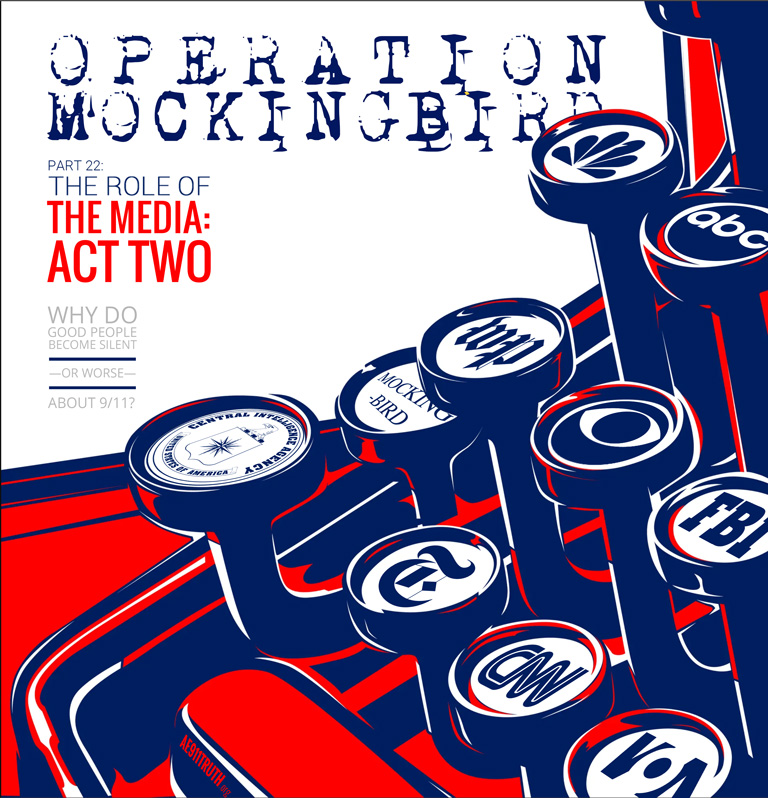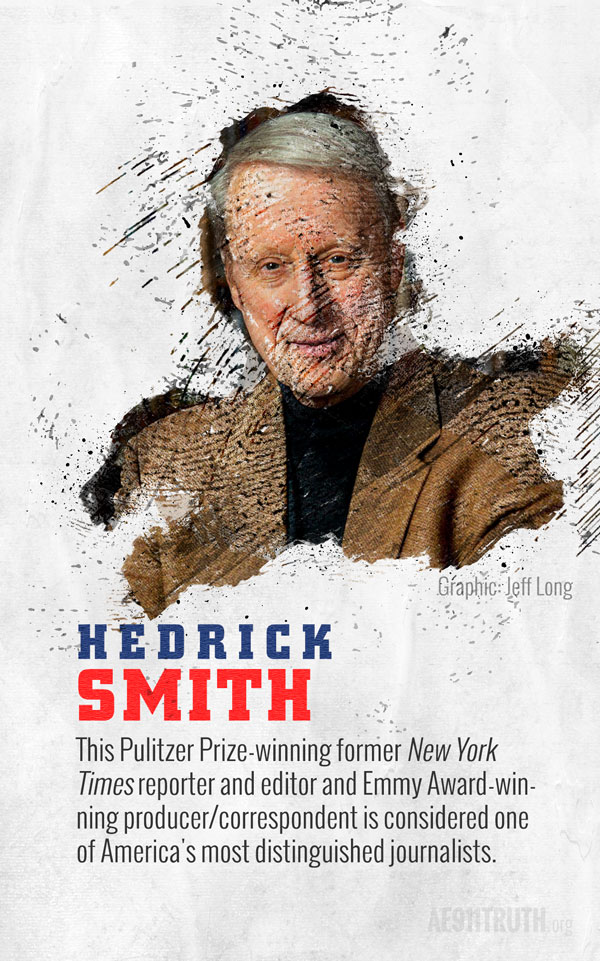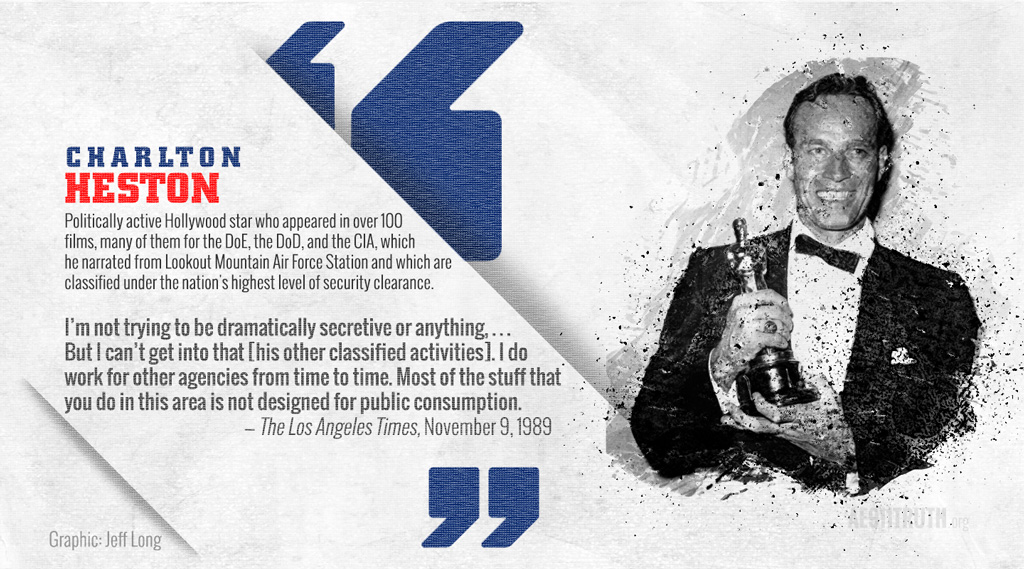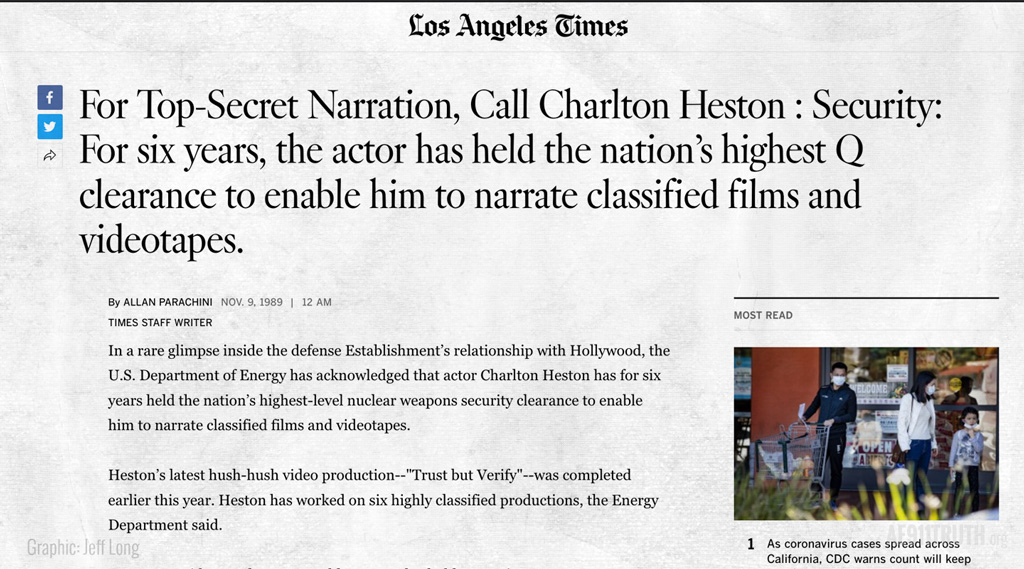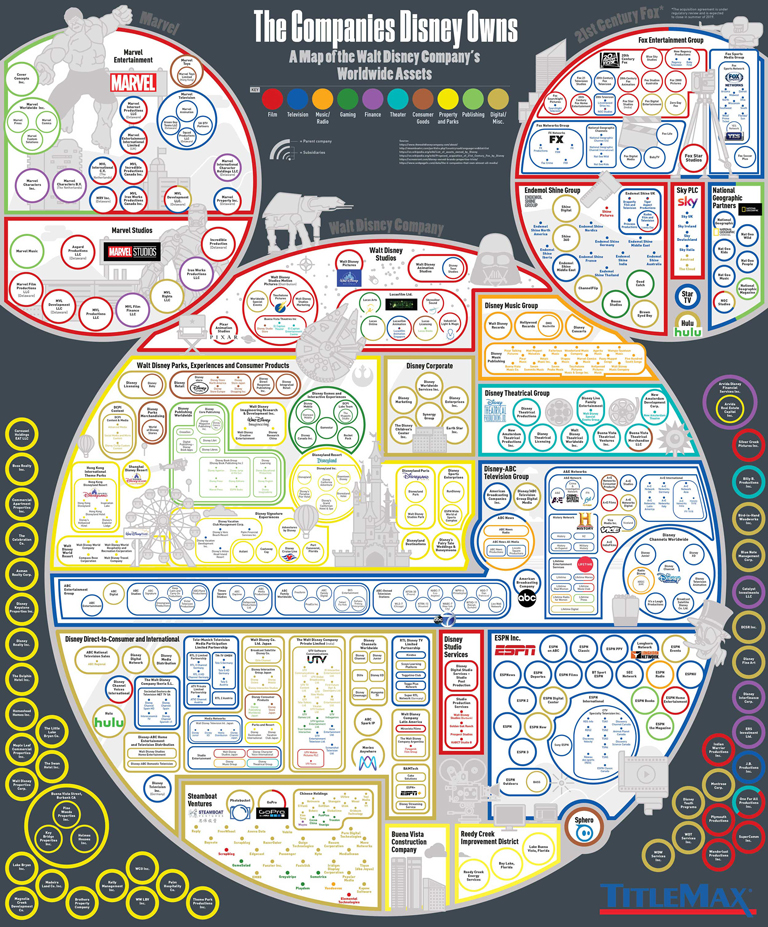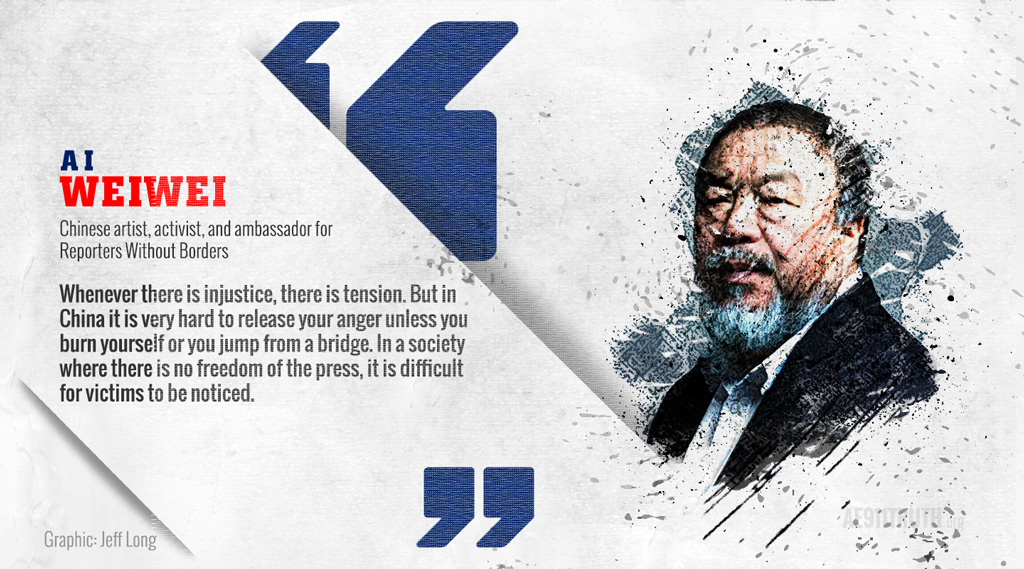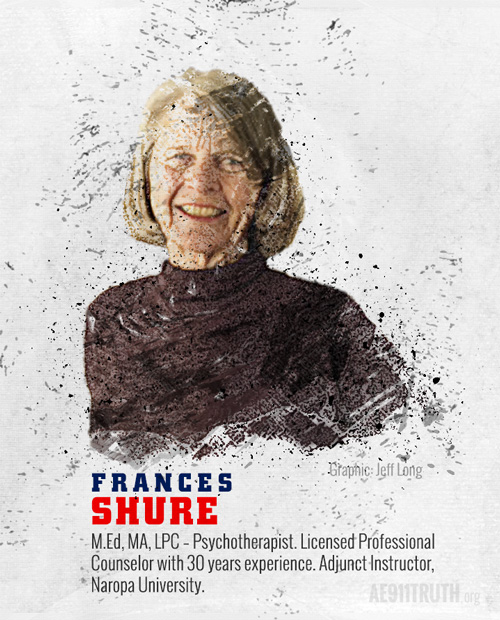 Editor's Note: Frances Shure, M.A., L.P.C., here resumes her series of articles for Architects & Engineers for 9/11 Truth that address a defining issue of our time: "Why Do Good People Become Silent — or Worse — About 9/11?" Each installment of this series has been a synthesis of academic research and clinical observations on the subject.
Editor's Note: Frances Shure, M.A., L.P.C., here resumes her series of articles for Architects & Engineers for 9/11 Truth that address a defining issue of our time: "Why Do Good People Become Silent — or Worse — About 9/11?" Each installment of this series has been a synthesis of academic research and clinical observations on the subject.
Please note that because Architects & Engineers for 9/11 Truth is dedicated to researching and disseminating scientific information about the destruction of three World Trade Center skyscrapers on September 11, 2001, and does not speculate as to the identity or motives of the perpetrators, any reference to names or motives of the attackers in this series of articles, made by either the author or the individuals she quotes, is a personal opinion and not the viewpoint of AE911Truth.
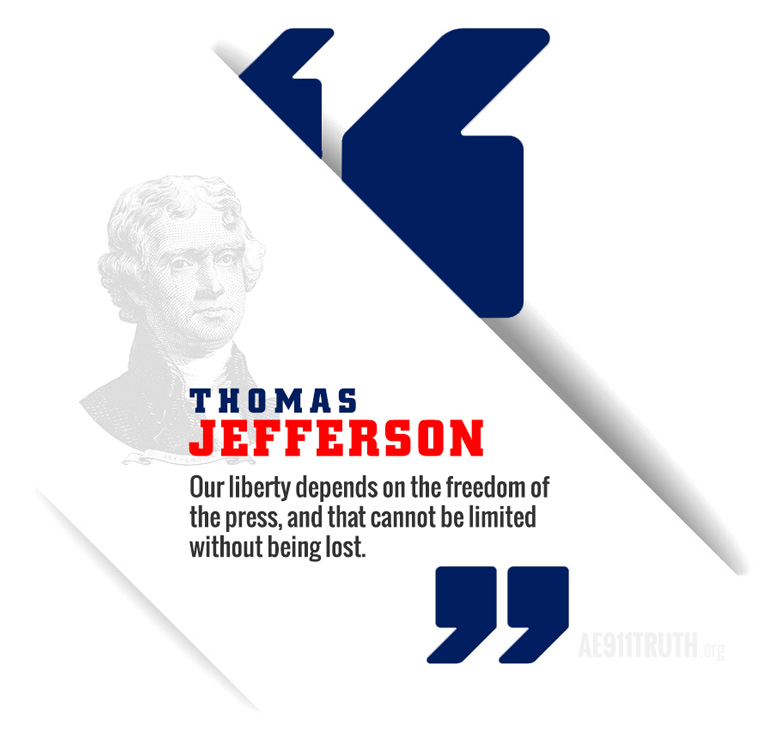
In the last installment of this series, Part 21, “The Role of the Media: Act 1 – Whatever Happened to Investigative Journalists?” I summarized the stories of four “witnesses” — three award-winning investigative journalists whose essays appeared in Kristina Borjesson’s 2002 anthology, Into the Buzzsaw: Leading Journalists Expose the Myth of a Free Press, plus FBI whistleblower-turned-independent-journalist Sibel Edmonds. In that piece, I let each journalist take the witness stand, so to speak. One by one, they revealed the insurmountable hurdles they faced in their efforts to inform the public of the facts buried under the rubble of official lies about the most newsworthy events of our time.
My conclusion from their witness testimony was that censorship is caused by two intertwined influences: (1) the powerful people who sit in the highest seats of our society’s mainstream institutions and (2) the corporate structure itself. Of the latter, I wrote:
Our global media have become subsidiaries of massive corporate conglomerates that do business in many other industries, including the manufacture of weapons for the military. These mega-corporations, in turn, contribute huge sums of money to members of Congress as well as enormous research grants to universities. In his farewell address, President Eisenhower warned of the military-industrial complex.1 But he surely knew that, in reality, the U.S. is saddled with the military-industrial-congressional-academic-media complex that is working overtime to achieve its own narrow goals, not for the benefit of the majority of citizens, not for the country as a whole.
Regarding the influence of the powerful, we learned that the censoring entities identified by all of the 19 journalists in Borjesson’s anthology were the Central Intelligence Agency (CIA), the Federal Bureau of Investigation (FBI), the Pentagon, military intelligence, media owners, the White House, large advertisers, powerful family dynasties, and extremely wealthy individuals.
It’s crazy how many former spooks have been hired at corporate news outlets like CNN & MSNBC as “analysts”. After spending their careers serving the national security state, they get to shape the news under the guise of expertise. It’s like state TV pic.twitter.com/uG48WSXGMe
— Rania Khalek (@RaniaKhalek) October 4, 2019
In from the shadows, reborn as cable news pundit ”journalists” propagandizing the public, these Deep State Actors are now cashing in. Toward the bottom of the article is a partial list of current U.S. intelligence officials currently working as employees on U.S. news TV programs. Click here: [Shills]
Since the CIA has long played such a unique role in manipulating the media both in the U.S. and abroad, I will now, in this installment, give this muscular body composed of national security intelligence operatives the special attention it warrants. In so doing, I will demonstrate the clear overlap that exists between the CIA (part of the powerful) and the mainstream media’s executives and journalists (part of the structure). Then, in Part 23, I will focus on how the media structure itself enormously contributes to censorship.
But first, let me recount an astonishing, not exactly amicable, exchange I had with a distinguished journalist of 50 years, Hedrick Smith, who spent more than two dozen of those years at The New York Times. Our verbal altercation occurred on April 9, 2013, at the Conference on World Affairs in Boulder, Colorado, which brings together thought leaders to discuss “everything conceivable.” I had been especially anticipating attending the panel on “Journalism for a Better Tomorrow, Tomorrow,” which featured, among other less-recognizable names, the Times’ Smith. (He was also keynote speaker of the entire conference.)
My encounter with Hedrick Smith
I’ll preface my tale with this bit of background: One of the historical events I learned about when first tumbling down the 9/11 Truth rabbit hole was “Operation Mockingbird,” a secret program designed to manipulate media both overseas and in the U.S. for propaganda purposes. In 1975, a U.S. Senate committee chaired by Sen. Frank Church, a Democrat from Idaho, was tasked with investigating this clandestine CIA operation.2
Even though Mockingbird was in the back of my mind throughout the panel presentation, I had no intention of bringing it up. But after panelist Shane Bauer3 divulged that, as a prisoner in Iran, he was asked by an interrogator to name the newspapers owned by the CIA, I decided this was an opening for me to inquire about Mockingbird. I was especially curious to know if it was still in existence. Unfortunately, I was ill-prepared to ask my questions coherently and utterly unprepared for the shocking reaction I was to receive.
Below is the transcript I typed from a recording of the panel presentation that I purchased after the event. Note that, for the most part, the ellipses indicate not words I have left out but Hedrick Smith’s continual interruptions of my attempts to speak.
Frances Shure: I’ve just come from the National Conference on Media Reform, so I’ve been immersed in all of this. And partly from that conference — two quick questions. Help me understand the conundrum, since our mainstream media have been consolidated into five corporations that are all tied to the defense agencies — to the military-industrial complex — they are very wealthy corporations. [So] why are they lacking in money for investigative journalism?
The second question is for Shane. When someone asked you if the CIA controls the news — of course we know things aren’t simplistic, [but] we do know about Operation Mockingbird. That should be part of the picture. I know it’s more complicated, [but] help me understand the complication of that picture.
Shane Bauer: Could you clarify your question? You want to understand the complication . . .
Shure: Someone asked you if the CIA is controlling our mainstream media — or most of the media outlets of any significance.
Bauer: They asked me which papers they owned.
Shure: Well, according to — who is the CIA director who said, “All media of any significance are owned by the CIA”? William Colby! That’s a statement he gave in a congressional hearing. Operation Mockingbird was started, I think, in the 1950s. So we know that exists. That’s [on] record, so . . .
Here, I am cut off by Hedrick Smith.4 Even though I had addressed Shane Bauer, Mr. Smith apparently felt the need to take control of the conversation.
Smith [sounding irritated]: Wait a minute, wait a minute. We don’t know that exists. We know that he [Colby] said that; [but that] doesn’t mean that it exists; we simply know he said that.
Shure: Well, I’m sorry, I’m too ignorant to know more about that congressional record, but assuming that this is true . . .
At this point, I badly want to ask Mr. Bauer if he thinks Mockingbird is still covertly operating, but my every attempt to spit out that query continues to be thwarted.
Smith [very irritated now]: We don’t assume it is true.
Shure: Well, I’ve looked into it a little bit and I know there is something that was called Operation Mockingbird . . .
Smith [still irritated and obviously not wanting this conversation to have a life]: There may have been. You may know more than I do . . .
I try to speak, but Mr. Smith interrupts before I can get another word in edgewise.
Smith: I certainly know a lot about American journalists and about American newspapers, and I’m not aware of a single one that is owned by the CIA or run by the CIA.
Shure: Well, not overtly, of course. . . but . . .
Smith [grumpily]: I’m sorry, I don’t understand what you mean.
Shure [trying to explain]: Of course, the CIA would not try to control the media overtly. It’s obviously a covert operation, but my question is . . .
Smith [sarcastically]: No, it’s not obviously any kind of operation. You’re making enormous assumptions in the statement of your question, and I don’t buy them as a reporter. I don’t buy them if they come from the left or the right or the other planet.
The audience, approving of his ridiculing tone toward me, starts clapping, but stops abruptly upon hearing my next statement.
Shure [politely but firmly]: Well, I’m going to ask everybody here, including you, to go look up Operation Mockingbird, do some research on it, and find out for yourself if it existed or not. I’ve done enough research myself to know that it was an operation . . .
Smith: And what was it?
Shure: It was an operation to control what gets disseminated in our media.
Smith [condescendingly]: Well, I wanna tell you something. I’ve been an editor for The New York Times, and I’ve been a Washington bureau chief, and [laughing] it is such a scramble every day, and the notion that someone is controlling just one newspaper is just one wild . . .
Panelist Jon Sinton5 [piling on, though with an obsequious tone in contrast to Hedrick Smith’s domineering one]: Amen, brother! There’s a lot of credit . . .
Smith: I’ve worked in the Soviet Union and I’ve worked in Vietnam and I’ve worked in Egypt and I’ve worked in dictatorships and I know what a controlled media looks like. The American media is controlled by its own stupidity, its own laziness . . .
Sinton [piling on again]: And greed!
Smith: . . . [and] its own lack of intellectual vigor, but it’s not controlled by Big Daddy!
Shure: Well, you are really touching on what I am asking . . .
I naïvely press on, hoping I will eventually be able to ask my question.
Smith [sarcastically]: Maybe I’m guilty of what you think Operation Mockingbird is about — here I am — the CIA mouthpiece!
Sinton laughs uproariously, and the audience follows suit.
Shure: What I’m asking is . . . what I’m asking is . . .
At this point I’m still trying to gain an understanding of the complexities of the CIA’s past — and possibly ongoing — relationship with the media, but to no avail.
Moderator Erika Stutzman:6 I’m sorry, one of our producers is asking us to move on to another question because we’ve had so many . . .
Shure [determined not to be dismissed yet]: OK. But I had my other question . . .
Sinton [authoritatively and condescendingly]: In one sentence I can answer your other question. Disney, Comcast, News Corp, Time-Warner — the big corporations who control all the media. . . . They aren’t keeping great news from you; they can absolutely afford to provide you with great news. You don’t want great news, because when they go and do the research, what they discover is that you want to figure out how to get Martha Stewart’s upside-down cake, and that’s what they are going to report on, and they’re not going to pour money into a rat hole into stuff they think that you don’t want and don’t watch. It may be laziness, but mostly it’s greed.
Stutzman: We need to move along here.
I was stunned by Jon Sinton’s last statement. According to him, the reason there are so few investigative journalists is not that media outlets lack the funds to pay them for time-consuming, in-depth research but that we, the consumers of the news, are too shallow-minded to want real investigative stories. I wondered whether Sinton had inadvertently let down his guard — if the tension between Hedrick Smith and me is what had prompted Sinton to treat the entire audience with such dripping condescension.
Mr. Smith apparently thought he had the last word and the upper hand when, as the Q&A wrapped up, he uttered one more sardonic quip about the CIA, which brought scattered laughter from the audience at my expense. Before he could leave, though, an activist friend of mine walked on the stage and handed him a copy of Carl Bernstein’s 1977 Rolling Stone article, “The CIA and the Media: How America’s Most Powerful News Media Worked Hand in Glove with the Central Intelligence Agency and Why the Church Committee Covered It Up.”7
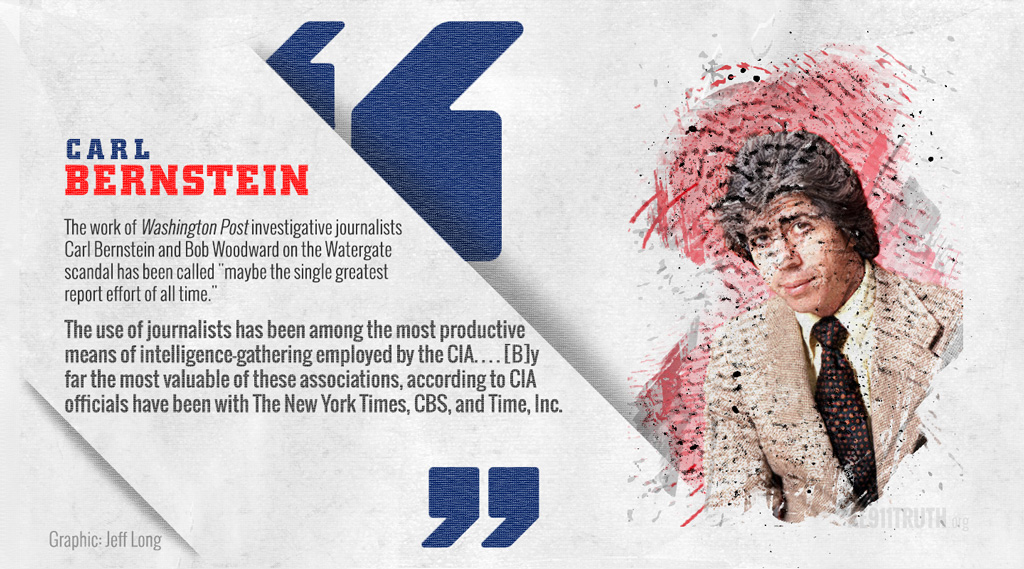
With obvious agitation, Hedrick Smith reluctantly grasped the document and exited the stage.
Why did this Pulitzer Prize-winning journalist become so protective, so hostile, when asked about the connection between the media and the CIA? Was I misinformed about Operation Mockingbird? Or was Hedrick Smith ignorant of its existence? He certainly exhibited zero curiosity. Being the educated journalist that he is, I suspect he knew something about Operation Mockingbird but was caught off guard and so became defensive and tried to censor my inquiry.
I did not approach the panel with any feeling or tone of accusation. I assumed everyone on the panel already knew about Mockingbird and would freely admit as much. I was simply curious as to whether or not the CIA is still embedded within the compliant media. I thought it a likely possibility, considering that no corporate-controlled news outlets, neither print nor broadcast, had explored the 9/11 topic in an unbiased, honest way. Their silence was a frustrating mystery to me, but I had carefully not broached that taboo topic at the conference, having ascertained, from previous experience, that it would elicit groans and scornful remarks from audience and panelists alike — thanks in large part to the silence of the media itself on this elephant in our national living room.
My further encounters with Conference on World Affairs panels revealed that the organization was definitely not living up to its claim of openly discussing “anything conceivable.” For instance, the mere mention of “empire” in other Q&A sessions sent some panelists scrambling defensively, as though they had never heard the word associated with the USA. “For goodness sake,” I thought, “books have been written on this very subject — American imperialism!”8
It would have been so easy for Hedrick Smith to answer my questions forthrightly — as an honest, or at least inquisitive, professional journalist would do. Since he did not — or could not, whichever was the case — I thought it would be instructive to contrast his defensiveness with the voices of his colleagues who have not shied away from spelling out the exact role the CIA played in the media during the Cold War era.

The historical context
The aftermath of the Second World War was a time of growing fear of communism among Americans. Joseph Stalin, who presided over the Soviet Union, an Allied power throughout WWII, had in the late 1940s and early 1950s taken over Eastern Europe and was threatening a worldwide communist revolution. Countering that ideological threat quickly became the most important move in the United States’ domestic and international political playbook. It is for this reason that the CIA and American journalists initially joined forces and became intimately engaged in fighting the Cold War between the U.S.S.R. with its satellite states and the U.S., which by then no longer considered the Soviet Union its ally.
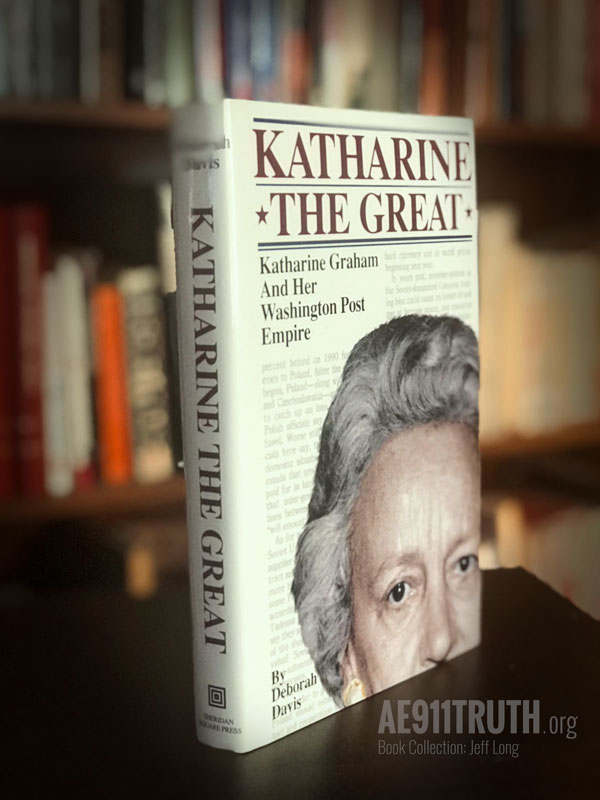 Katharine the Great: Katharine Graham and Her Washington Post Empire by Deborah Davis
Katharine the Great: Katharine Graham and Her Washington Post Empire by Deborah Davis
In Katharine the Great,9 a biography of Washington Post owner Katharine Graham, author Deborah Davis relates that Frank Gardner Wisner, a complicated character and a major player in CIA covert operations, created “Operation Mockingbird" in response to the communist takeover of the International Organization of Journalists (IOJ). The CIA’s Cord Meyer, Jr. was to become Mockingbird’s principal operative.
The IOJ, launched in 1946 in Copenhagen, Denmark, to represent journalists worldwide, had become dominated by communists, had received support from the Soviet Union, and of course had promoted the communist message. Reporters employed by every major newspaper in Europe were being strongly influenced by the IOJ.
Into this drama stepped Wisner and his “Mighty Wurlitzer” — the name he gave a network of small “front” organizations and publications that, he bragged, the CIA was using to promote the capitalist message.10
Just like the magnificent pipe organs of old that imitated the various instruments of a symphony orchestra, Wisner’s “Mighty Wurlitzer” was capable of playing any propaganda tune that he determined would undermine communism around the world. The network of small front organizations that were set up and funded by the CIA was mainly made up of U.S. citizens who, wittingly and unwittingly, were paired with their counterparts in other countries for propagandistic purposes.
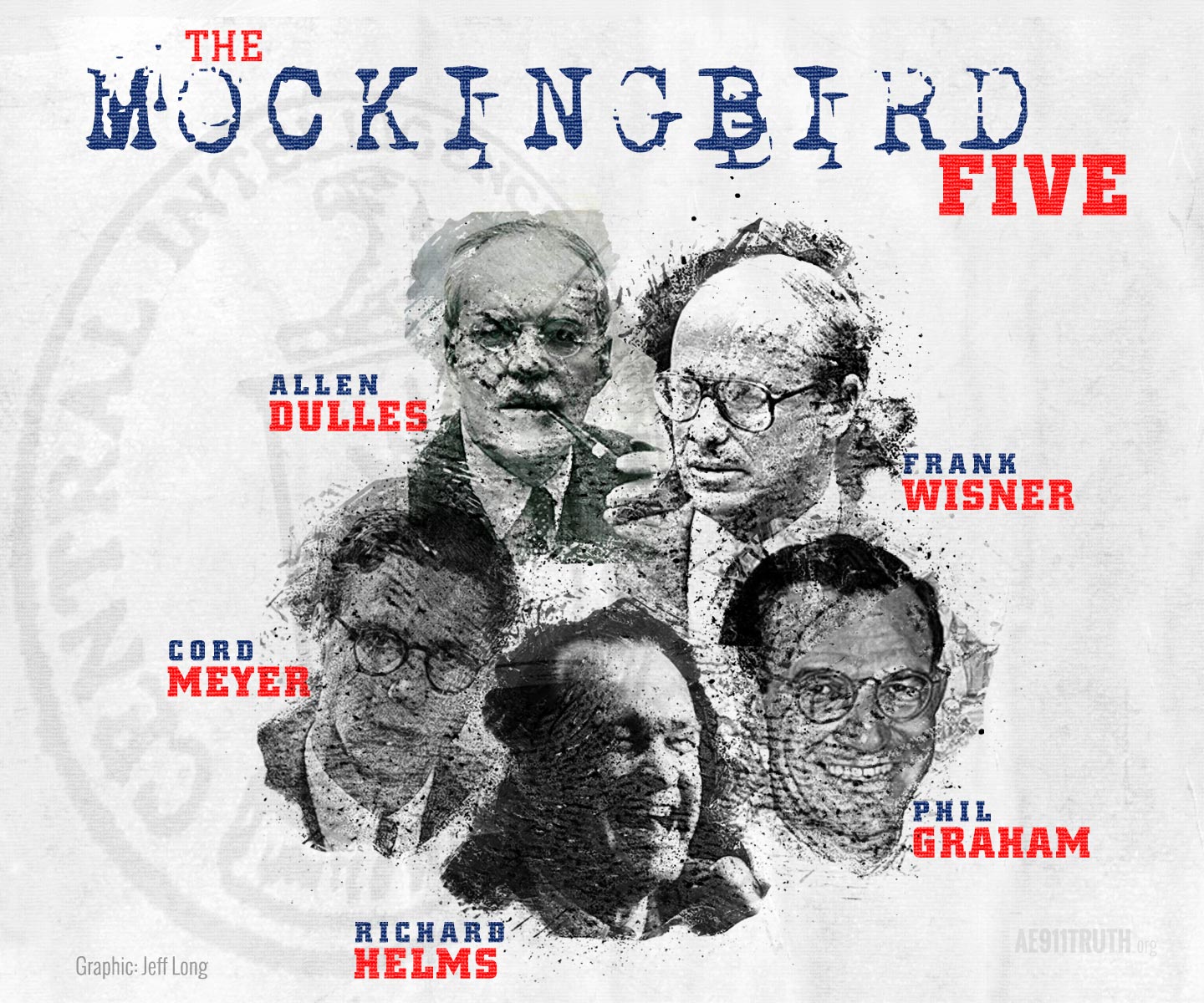
These American front groups included emigrants, labor unions, artists, student groups, women’s organizations, Catholics, Afro-American citizens, and journalists. Their superficial purpose was to connect with and aid their “non-communist left” compatriots in Europe — and, later, in the rest of the world. Their real purpose, however, was to contain communism and roll back the Soviet empire by demonstrating to communism’s sympathizers the superiority of a liberal democracy.
Ironically, Wisner’s front groups were modeled after the successful communist front groups that were secretly set up and funded by communist sympathizers in both Europe and America as early as the 1930s. The missions of these groups were purportedly altruistic — fighting imperialism and fascism, and advocating for peace — but their real goal was to “defend and spread the Bolshevik revolution.”11
Enter U.S. diplomat, historian, and scholar George F. Kennan. He was that era’s author of the policy of “containment” — that is, containing communism. Having observed his countrymen’s history of organizing into associations to champion the cause of freedom, he proposed harnessing this peculiar American proclivity for the purpose of national security.12 So Secretary of State George C. Marshall (of Marshall Plan fame) appointed Kennan to create and direct the Policy Planning Staff, which acted as the internal think tank for the U.S. Department of State.
Kennan determined that, since political warfare is both overt and covert, the two operations should be coordinated by and be under the control of the State Department. At the same time, since Kennan “wanted to have his cake and eat it too . . . [he ensured that] the State Department should not be formally associated with the conduct of covert operations.”13
People who plan covert operations face several dilemmas. How do they conduct unsavory — even outright criminal — activities and at the same time guarantee plausible deniability for themselves? And how do they manage covert agents so that the agents are free to act and yet are not without some oversight?
The U.S. government’s first attempt to provide structure for these competing needs was the National Security Council’s NSC Directive 10/2, approved in June 1948 by President Harry Truman. The directive called for creating an Office of Special Projects (a name subsequently changed to the Office of Policy Coordination, or OPC). In addition to specifying a mechanism to approve and manage covert operations, 10/2 also was the first directive in which the term “covert operations” was defined. The Director of Central Intelligence was charged with “[e]nsuring, through designated representatives of the Secretary of State and of the Secretary of Defense, that covert operations are planned and conducted in a manner consistent with US foreign and military policies and with overt activities.”14
The OPC was endowed with the powers to conduct any covert activities related to . . .
. . . propaganda, economic warfare; preventive direct action, including sabotage, anti-sabotage, demolition and evacuation measures; subversion against hostile states, including assistance to underground resistance movements, guerrillas and refugee liberation groups, and support of indigenous anticommunist elements in threatened countries of the free world.15
In 1950 the OPC was brought under the CIA’s control. Depending on his political inclination, each succeeding U.S. President changed the mechanism to provide more or less oversight over CIA covert operations.16 We shall see that presidential control was eventually thrown out the window, allowing the CIA to become the freewheeling agency it still is today — and even permitting it to become legally immune to prosecution.
As Director of Policy Planning, Kennan appointed Frank Wisner as his assistant director. Of course, there was much overlap of the covert operations they planned and oversaw, but they had the identical mission of destabilizing communism around the world with as many methods as possible.17
Thus we have the Cold War in full force — spy vs. spy, ideology vs. ideology. This huge clash inevitably created a cacophony of competing propagandistic tunes.
The front-group orchestra directed by Kennan and Wisner was merrily playing its capitalistic tunes — until suddenly it wasn’t. What silenced it?
According to Hugh Wilford in his book The Mighty Wurlitzer, Wisner watched helplessly as pro-Soviet state security police gunned down hundreds of protesters in the student-led Hungarian Uprising of 1956. Having been encouraged by improving relations between the U.S. and Hungary and by front-group propaganda, the protesters who were attempting to overthrow their communist government likely thought there would be military help from the West. There was not. Feeling responsible for this atrocity, Frank Wisner was devastated. He soon became dysfunctional and in 1965 took his own life.18
Nevertheless, the CIA kept up its covert front-group operations for over a decade until 1967, when Ramparts, a left-wing California magazine, published an article by then-leftist Sol Stern (later he became politically conservative) that exposed CIA funding of the National Student Organization. In the ensuing days, The New York Times and the Washington Post (both well-entangled with the CIA, as we shall soon see) tripped over themselves exposing other Agency front organizations. The media frenzy that was unleashed by this race-to-tell-all culminated when TV reporter Mike Wallace was shown, in an hour-long CBS News documentary titled “In the Pay of the CIA: An American Dilemma,”19 standing before a large, three-dimensional diagram that depicted the flow of covert subsidies to CIA front organizations.
Front groups funded by the CIA are, by definition, based on secrecy and deception — obviously actions not in line with a free society that values openness and honesty. Thus it was that in 1985 the architect of this scheme, George Kennan, concluded, “Operations of this nature are not in character for this country. . . . I regret today, in light of the experience of the intervening years, that the decision was taken.” Despite Kennan’s acknowledgement and apology of sorts, the CIA did not abandon its front-group strategy.20 To this day, it is alive and well.
Let us return now to our discussion of “Operation Mockingbird,” a highly valuable covert operation within the Mighty Wurlitzer that involved the use and manipulation of both journalists and media executives, according to Katharine Graham biographer Deborah Davis.
We will now seek to answer the question:
Was there really an “Operation Mockingbird”?
Philip Graham, Katharine’s husband and, preceding her, owner of the Washington Post until his death, believed that one of the primary functions of the press was to mobilize support for government policies. This is not what we’ve been taught about the role of the press, though, is it? Rather, we have been given the understanding, both in school and in society, that a free press is critical to maintaining a free society, as it enables an enlightened citizenry to make wise decisions about how to run their government and their lives. In other words, a free press should act as the Fourth Estate — a watchdog overseeing the government, not an obedient lapdog of the government.
Some additional history here will help us understand Philip Graham’s startling position.
From the 1940s through the 1960s, politicians and newspapermen who did not take public positions against communism were labeled communists and quickly became pariahs, losing their friends and their jobs. Fear of communist bogeymen around every corner gripped the nation.
Salient examples include the following historical events: U.S. Senator Joseph McCarthy (R-Wisconsin) became the poster child for the communist witch hunt because of his accusatory speeches and the 1954 hearings of the U.S. Senate’s Subcommittee on Investigations. His tactics when he accused certain members of the U.S. Army of being communists, televised around the world and deemed unsavory by commentators and viewers, contributed to his undoing.
The CIA’s Global Propaganda Network – #PropagandaWatch — a Corbett Report Series
This week [1/21/2020] on his regular "de-program" #Propaganda Watch, James digs up an old New York Times report on the CIA’s “Mighty Wurlitzer,” a global propaganda network that included hundreds of journalists, editors, academics, publishing houses, newspapers, magazines, and front companies. Although the Times article is, as expected, a limited hangout, it does provide some interesting pieces of the global intelligence propaganda puzzle. [Show notes]
California’s Richard Nixon, an avid anti-communist, gained a seat in the U.S. House of Representatives and joined the House Un-American Activities Committee (HUAC), which Congress formed in 1938 and which became infamous in the 1950s for its witch hunt-like interrogations of citizens to determine if they had communist ties. Many citizens employed by the government, universities, the film industry, newspaper organizations, and elsewhere were accused of being communist sympathizers and spies. When these citizens refused to testify, they became blacklisted. Some of them chose to leave the country.
Nixon played a major role in accusing the former State Department advisor Alger Hiss of being a communist spy. Though Phil Graham had previously declared himself an avid anti-communist, his defense of Hiss in the Washington Post caused then-Congressman Nixon to accuse the Post of being a communist newspaper. When Hiss was eventually found guilty of perjury, though, Graham abandoned him.
Graham and his “liberal intellectual” compatriots felt that communism could be fought, not with the bludgeoning, search-and-destroy actions of McCarthy, Nixon, and their ilk but with more clandestine tactics — that is, by engaging in psychological manipulation, espionage, counterintelligence, and covert operations. In that era, therefore, the CIA was considered a “liberal” organization, and FBI Director J. Edgar Hoover, who had allied himself with HUAC in its hunt for spies and communists, publicly declared the CIA to be a communist organization!21
This is no joke. It is real U.S. history. It sadly reminds me of the current post-9/11 years, which have likewise been characterized by fear of and outrage toward a ubiquitous and hidden enemy. These days we see “patriotic” flag-waving and the “Let’s roll!” mentality. We see a witch hunt for Muslim “terrorists.” We see the approval of torture by high-level government officials as well as by ordinary Americans. We see YouTube’s growing censorship of and admonitions about 9/11 videos and other videos that even remotely suggest criticism of official proclamations.22
Back to the Cold-War era, though. The fear of communists around every bend escalated in the U.S. until Joseph McCarthy was finally censured by the Senate, until President Truman called HUAC “the most un-American thing in the country today,” and until Jerry Rubin and Abby Hoffman of the 1960s’ Yippies, among others, made a mockery of the HUAC hearings.
Hopefully, this snapshot of history, which portrays the pervasive fear of communism in the U.S., helps us understand why the avid anti-communist, “liberal intellectual” Phil Graham was eager to help the CIA. I don’t mean to exonerate him. And I most certainly don’t mean to excuse his friend Frank Wisner, who, in addition, oversaw the creation of all the infamous “stay behind” armies in East and West Europe, known commonly as Operation Gladio,23 which were responsible for bombings, assassinations, and kidnappings that were all blamed on the communists in order to turn people away from the left and toward the political right.
I do mean to present all the characters in that real-life drama — just as those who play parts in today’s 9/11, real-life drama — as complicated people living in a complicated time, rather than cookie-cutter, black-hat or white-hat players.24
In Katherine the Great, Debra Davis coins the term “mediapolitics.” She applies it to Phil Graham, whom she analyzes this way:
There was politics as it appeared to be, as his editors presented it to his readers; and underlying that, politics as it really existed for him, as it was understood by the intelligence community. This reporting of politics with an eye toward government interests formed a new category of thought that can be called mediapolitics. Philip Graham, believing that the function of the press was more often than not to mobilize consent for the policies of government, was one of the architects of what became a widespread practice: the use and manipulation of journalists by the CIA.25
If we go back and reread Part 13, we will recognize Davis’ “mediapolitics” as a crucial component of Peter Dale Scott’s “deep politics.” I say this because deep politics cannot succeed with its deceptive agendas without the cooperation of the media. So it is that media organizations complying with the dictates of secretive, influential political players effectively become part and parcel of the “deep state.”
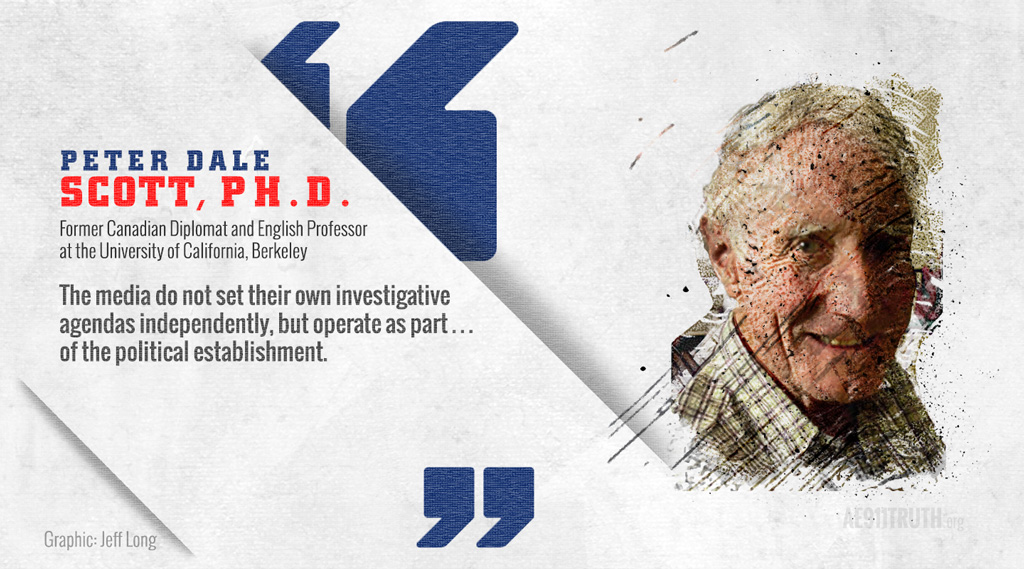
Thus, the “liberal intellectual” strategy to contain or roll back communism along with the philosophical acceptance of mediapolitics, motivated Phil Graham to help Frank Wisner conceive a formally structured program run according to policies designed at the highest levels. This program’s code name, says Debra Davis, was “Operation Mockingbird.” Its purpose was to manipulate journalists — and hence their readers, viewers, and listeners, both foreign and domestic — toward support for and appreciation of America and capitalism.26
CIA agents who go undercover as accredited news correspondents naturally have a high degree of access to people and places abroad, enabling them to give the CIA information — and potential recruits — that would otherwise be very difficult to acquire. Similarly, accredited journalists who do “favors” for their CIA handlers can accomplish the same goals for the Agency.
According to Davis, “By the early 1950s, Wisner ‘owned’ respected members of The New York Times, Newsweek, CBS and other communication vehicles.” She quotes his colorful quip, “You could get a journalist cheaper than a good call girl, for a couple hundred dollars a month.”27
Unfortunately, Davis does not divulge the identity of the person who revealed the “Operation Mockingbird” code name to her. And, to date, no official has publicly confirmed the use of the term. Regardless, its existence has most definitely been confirmed. That is why, despite the lack of official sanction, in-the-know researchers continue to use the term.28
Incidentally, after more than three decades of secrecy, a 1973 CIA report on the Agency’s own illegal and inappropriate activities from the 1950s until the mid-1970s, informally titled “Family Jewels,” was declassified in 2007. This report refers to a “Project Mockingbird” involving the wiretapping of two American journalists.29 [Emphasis added.]
Thus, I apologize to Hedrick Smith for being misinformed, since the term “Operation Mockingbird” was never officially endorsed. I hope he will, in turn, inform himself of the actuality of the CIA’s influence in the media. I sincerely welcome a civil dialogue with him, should he chance to read this essay.
The Very Special Role of the CIA within the Media
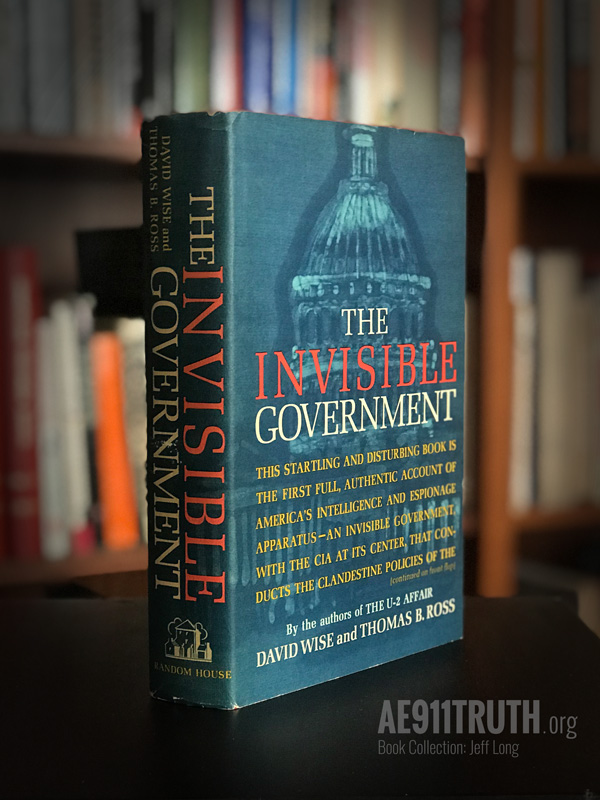 The Invisible Government by journalists David Wise and Thomas B. Ross
The Invisible Government by journalists David Wise and Thomas B. Ross
The 1973 release of “Family Jewels” was not the only setback for the seemingly untouchable, unaccountable CIA. From the mid-1960s through the early 1980s, several intrepid journalists and whistleblowers exposed the espionage agency’s dirty laundry for the world to see. The sight was none too pretty.
One such revelation came from journalists David Wise and Thomas B. Ross, whose 1964 book, The Invisible Government,30 was the first exposé of the CIA’s covert operations in other countries, including its role in foreign government coups. Remarkably, The Invisible Government was released despite attempts by the Agency to intimidate the authors and the publisher, Random House. The latter, to its credit, responded that the CIA was welcome to purchase all the copies of the book, but if it did, another printing would be done. Even though the Agency — or “the Company,” as insiders variously call it — then began a smear campaign to manipulate reviewers to trash the book, it nevertheless became a best seller.31
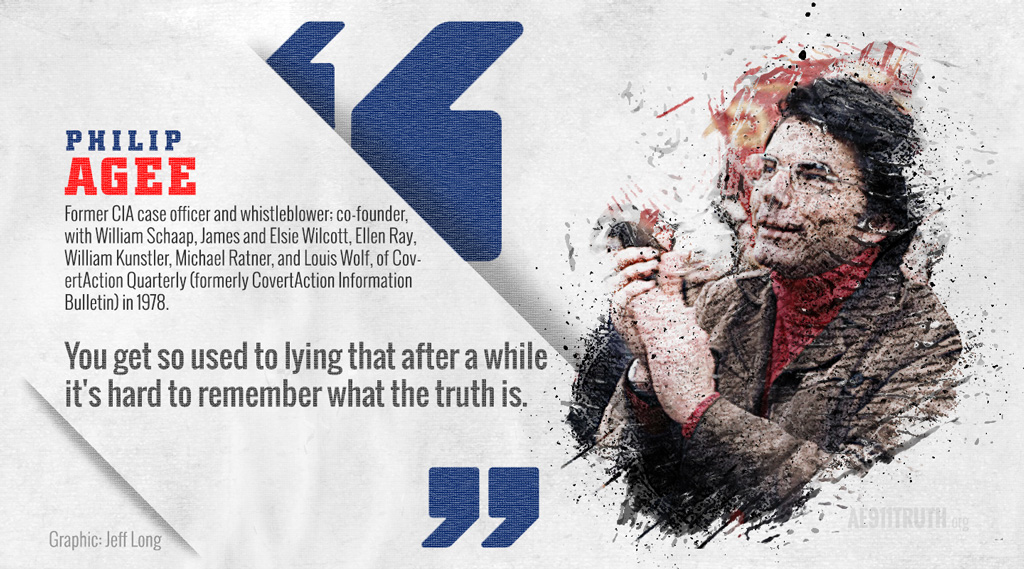
Philip Burnett Franklin Agee (1935–2008), a Central Intelligence Agency (CIA) case officer and writer, was best known as the author of Inside the Company: CIA Diary (1975), which identified about 250 CIA officers, front companies, and foreign agents who were either then working or had previously worked for the United States. Agee joined the CIA in 1957 and over the following decade had postings in Washington, D.C., Ecuador, Uruguay, and Mexico. After resigning from the Agency in 1968, he became a leading opponent of CIA practices. Exiled from the U.S. and expelled from the U.K., Agee died in Cuba in 2008.
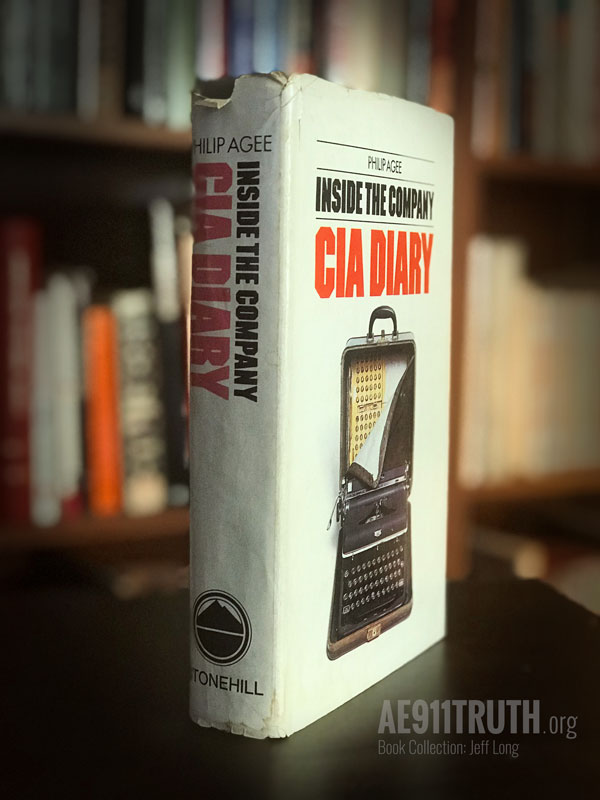 Inside the Company: CIA Diary by Philip Agee, a former CIA case officer and co-founder, in 1978, of CovertAction Quarterly (formerly CovertAction Information Bulletin) with William Schaap, James and Elsie Wilcott, Ellen Ray, William Kunstler, Michael Ratner, and Louis Wolf.
Inside the Company: CIA Diary by Philip Agee, a former CIA case officer and co-founder, in 1978, of CovertAction Quarterly (formerly CovertAction Information Bulletin) with William Schaap, James and Elsie Wilcott, Ellen Ray, William Kunstler, Michael Ratner, and Louis Wolf.
Following this groundbreaking publication, high-level CIA defectors and whistleblowers have come out, one by one, with their own tell-all tales, revealing egregious illegal activities, both foreign and domestic. They include Philip Agee, Victor Marchetti, John Stockwell, L. Fletcher Prouty, Ralph McGehee, and Frank Snepp. They accuse their former employer of planting stories in the foreign press meant to be picked up by the American news media (this was a violation of the Smith-Mundt Act of 1948, to be rescinded in 2013, as we shall later see);32 of lying to that self-same media and to the U.S. Congress (by law, a felony); of using its formidable propaganda arm to create fanciful, falsely positive images of CIA missions; and of destroying millions of lives by destabilizing governments, fomenting wars, engineering coup d’états, training death squads, teaching torture techniques, and covertly assassinating leaders of countries around the world. Worse yet, these whistleblowers contend, the CIA’s heinous crimes against humanity, ostensibly carried out to protect and further America’s interests, not only do not strengthen “national security” but actually damage it. Most of these truth-tellers, I’m pleased to say, reach the same — and sane — conclusion that the Agency should be abolished.
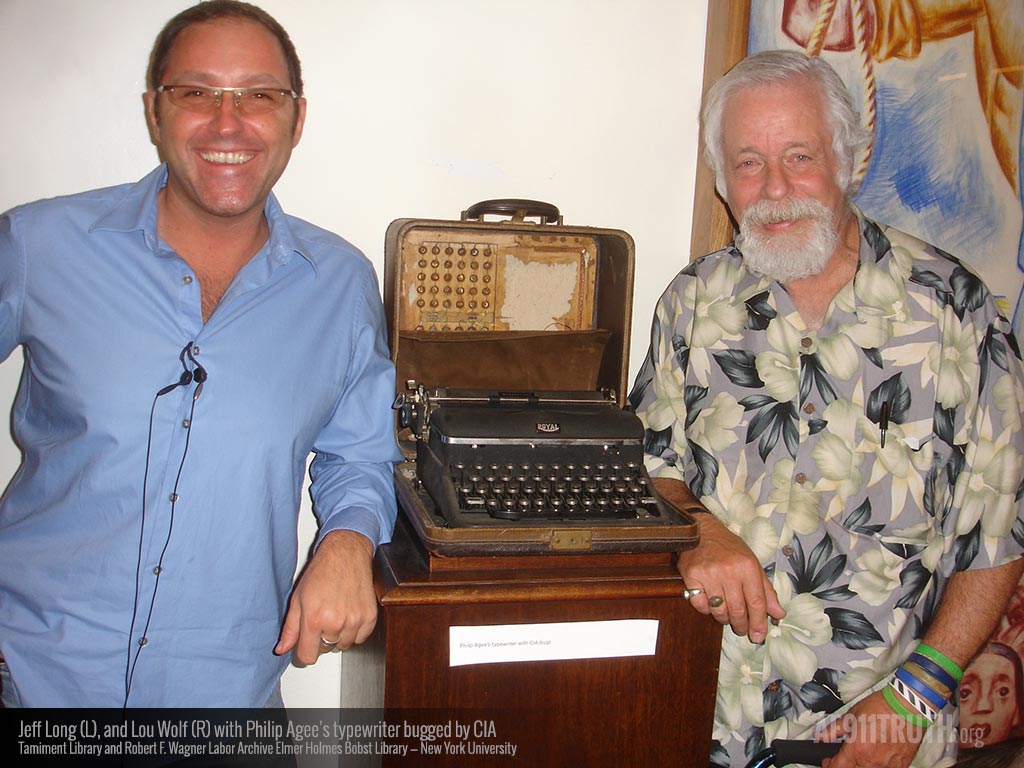
This is the typewriter Philip Agee used to write the manuscript for his first book, Inside the Company: CIA Diary. The CIA bugged Agee's typewriter to learn what he was saying about the Agency and to record nearby conversations. Lou Wolf and Jeff Long posed with the typewriter (permission required for access) in the Tamiment Library and Robert F. Wagner Labor Archive, the depository for Philip Agee's collection of personal papers, memorabilia, and artifacts at New York University's Elmer Holmes Bobst Library.
". . . Since bringing the typewriter that Leslie bought for me to Catherine's studio, I have been hearing a beeping sound on my own portable FM radio. I paid little attention, however, because of the nearness to ORTF and the frequent other interference I get. I reached under the table, raised the typewriter case with the machine inside, and began to turn it. As I turned it the beeping sound on my radio got louder and softer in direct relation to the turning. Catherine carried it out of the building and the beeping completely disappeared. When she returned it began again. Later I tore open the lining of the inside roof of the case and found an elaborate installation of transistors, batteries, circuits, wiring and antennas — also a tiny microphone for picking up voices. The objects were all very small, mounted in spaces cut out of a piece of 1/4-inch plywood cut exactly the size of the case and glued against the roof. Not only was the object designed to discover where I live through direction- finding, it appears also made for transmitting conversations." — CIA Diary: Inside the Company
One of the first books by a CIA whistleblower was Philip Agee’s 1975 narrative, Inside the Company: CIA Diary. Because it divulges the names of many CIA operatives around the world, Inside the Company is probably the main reason for the 1981 passage of the Intelligence Identities Protection Act (IIPA), which makes it a federal crime to expose covert agents. Later in this installment, we will read excerpts of some of the other defectors’ exposés and will also address a current push by the CIA to expand the IIPA’s protection of covert agents and their crimes.
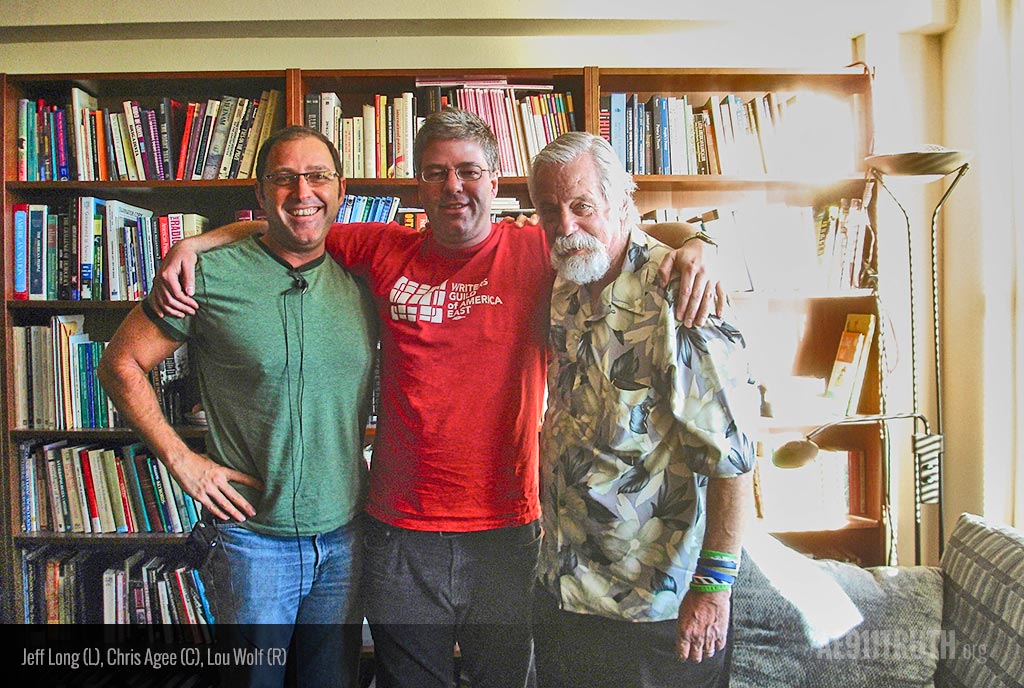
Philip Agee's son, Chris Agee, who as an adjunct professor teaches course in sociology and political science, is seen here with journalist Lou Wolf, who co-founded CovertAction Quarterly with lifetime friend Philip Agee, and Jeff Long, formerly with the U.S. Air Force and U.S. intelligence. While stationed in Europe, Long studied archived library copies of CovertAction Quarterly (CAQ), which were distributed by the CIA to its facilities worldwide during the Cold War. In 2018, on the 40th anniversary of CovertAction Information Bulletin (CAIB), its former writers and publishers relaunched both it and CAQ under the new name CovertAction Magazine (CAM). The relaunch team was headed up by co-founder, publisher, and writer Louis Wolf as well as investigative journalists, professors, organizers, funders, proofreaders, and legal representation. The expanded team includes Chris Agee, William Blum, Jack Colhoun, Michel Chossudovsky, Mark Cook, Jennifer Harbury, Bill Montross, Immanuel Ness, James Petras, Karen Ranucci, Stephanie Reich, Hobart Spalding, Victor Wallis, and Melvin L. Wulf, all of who worked with and/or wrote for the magazine in the past.
 On The Run by Philip Agee, former CIA case officer turned whistleblower
On The Run by Philip Agee, former CIA case officer turned whistleblower
A year prior to Agee’s disclosures, The New York Times ran a series by investigative reporter Seymour Hersh that opened with this stunning revelation:
WASHINGTON, Dec. 21—The Central Intelligence Agency, directly violating its charter, conducted a massive, illegal domestic intelligence operation during the Nixon Administration against the antiwar movement and other dissident groups in the United States, according to well‐placed Government sources.
An extensive investigation by The New York Times has established that intelligence files on at least 10,000 American citizens were maintained by a special unit of the C.I.A. that was reporting directly to Richard Helms, then the Director of Central Intelligence and now the Ambassador to Iran.33
The public, shocked by this exposé, pressured their representatives to examine the Times’ claims. In 1975, in response to this pressure, President Gerald Ford established the Rockefeller Commission, headed by Vice President Nelson Rockefeller; and Congress set up both the Pike Committee, chaired by Otis G. Pike (D-New York)34 in the House of Representatives, and the aforementioned Church Committee in the Senate, chaired by Frank F. Church (D-Idaho).
The CIA had tried to impose control over all three investigations and had largely succeeded with the Rockefeller Commission and the Church Committee. Pike was determined not to fall into this trap.35 I will now report on the importance of the Pike Committee Report and then will address the Church Committee.
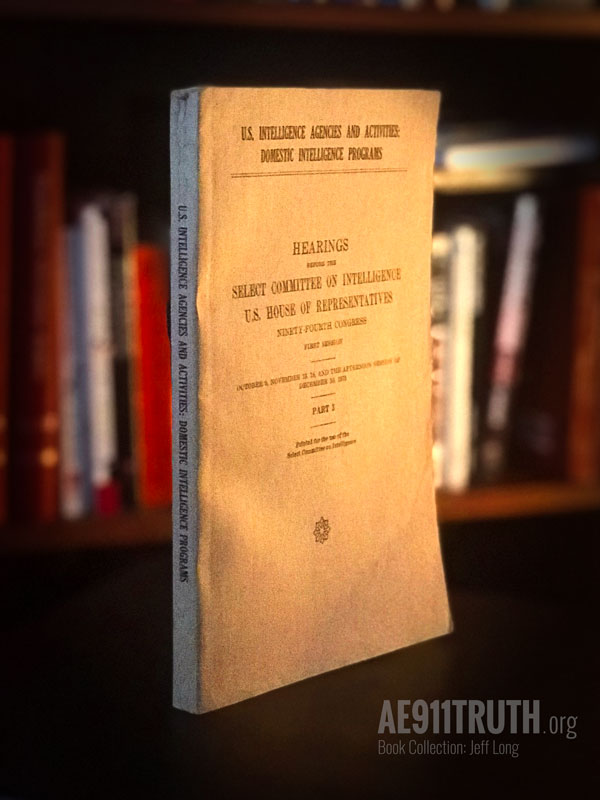 Transcript of a U.S. Intelligence Agencies and Activities: Domestic Intelligence Programs' hearing before the Select Committee on Intelligence of the U.S. House Of Representatives, Ninety-Fourth Congress, 1975.
Transcript of a U.S. Intelligence Agencies and Activities: Domestic Intelligence Programs' hearing before the Select Committee on Intelligence of the U.S. House Of Representatives, Ninety-Fourth Congress, 1975.
Despite foot-dragging, obfuscation, and delay in producing subpoenaed documents on the part of both the Ford White House and the CIA, the Pike Committee managed to produce a report that proved so disturbing that the full House of Representatives voted to prevent its publication unless President Gerald Ford approved it. Needless to say, Ford duly rejected release of the report.36
Since the Pike Committee’s report was never officially published, the Church Committee’s report has become, by default, the more well-known of the two. Nevertheless, before the Pike Committee ended in January 1976, its unpublished report was leaked. Parts of it were published in The Village Voice, and the full draft appeared in the U.K.37
Pike later reported that the CIA’s special counsel, Mitchell Rogovin,38 was so outraged by the Committee’s exposé of the Agency’s crimes that he threatened to end Pike’s career. The counsel told one of Pike’s investigators: “Pike will pay for this — you wait and see. I’m serious. There will be political retaliation. Any political ambitions in New York that Pike had are through. We will destroy him for this.”39
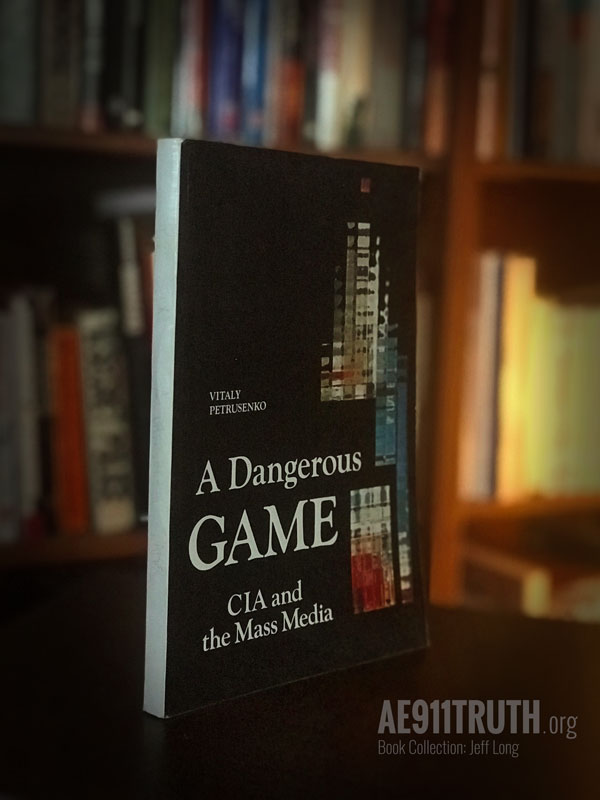 A Dangerous Game: CIA and the Mass Media by Vitaly Petrusenko
A Dangerous Game: CIA and the Mass Media by Vitaly Petrusenko
Thanks to these leaks, we know the Pike Committee found that at least 29% of the CIA’s covert operations budget was designated for media and propaganda. This amounted to $265 million in the 1970s — as much, at the time, as the combined budgets of the Associated Press (AP), Reuters, and United Press International (UPI). And even then, the committee “concluded that the 29% was a serious underestimate.”40
With such an immense budget, the CIA could — and did — fabricate news, and even evidence, wherever and whenever it wanted. According to award-winning journalist Nick Davies, who reported on the Pike Committee findings in his book Flat Earth News, the CIA owned outright — or owned substantial chunks of — many media outlets worldwide, in, for example, Japan, France, Germany, the U.K., Sweden, Belgium, Italy, Greece, and several South American countries. It spent $12 million on propaganda alone to unseat democratically elected President Salvador Allende in Chile. And it spent tens of millions more dollars to financially support favored political parties so it could influence foreign elections throughout the world.41
In the U.S., even though at that time in history the Smith-Mundt Act prohibited spreading disinformation domestically, the Agency unsurprisingly had few misgivings about doing just that through its hundreds of hidden human assets within the domestic media. A good number of these assets were buried within the Associated Press (AP) and United Press International (UPI) wire services that fed stories to newspapers throughout the entire world, not to mention stories planted in foreign media with the intention of landing in the U.S. A 1967 internal CIA directive concludes: “Fallout in the US from a foreign publication which we support is inevitable and consequently permissible.”42
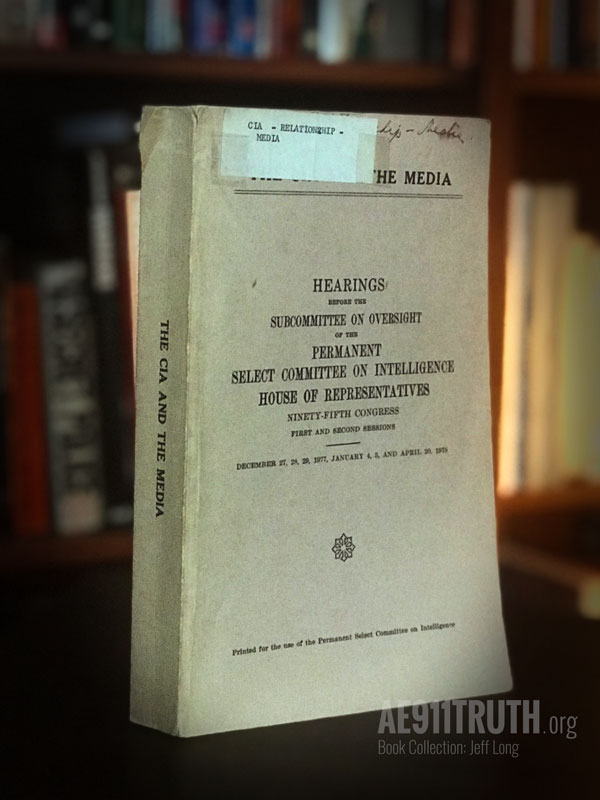 Transcript of The CIA and the Media: hearings before the Subcommittee on Oversight of the Permanent Select Committee on Intelligence of the House of Representatives, Ninety Fifth Congress, 1977–1978.
Transcript of The CIA and the Media: hearings before the Subcommittee on Oversight of the Permanent Select Committee on Intelligence of the House of Representatives, Ninety Fifth Congress, 1977–1978.
Now for more on the Church Committee. In January 1975, Sen. Frank Church (D-Idaho) was named chairman of the Select Committee to Study Governmental Operations with Respect to Intelligence Activities. The task of this committee was to investigate possible abuses of power by the CIA and the FBI. The committee’s report was published in April 1976. Among its findings were CIA assassination attempts (including successes) against foreign leaders; CIA and FBI abuses against (including assassinations of) American citizens; electronic and mail surveillance; covert acts to destroy marriages; criminal break-ins; and misinformation campaigns aimed at inciting violence against targeted individuals.43
Though only one small part of the Church Committee’s task was to determine if the CIA had abused its power in its dealings with media, the committee would be stunned at the abundance and depth of its findings in that area.
According to the Church Committee’s 1976 report:
The CIA currently maintains a network of several hundred foreign individuals around the world who provide intelligence for the CIA and at times attempt to influence opinion through the use of covert propaganda. These individuals provide the CIA with direct access to a large number of newspapers and periodicals, scores of press services and news agencies, radio and television stations, commercial book publishers, and other foreign media outlets.44
Church showed that the CIA used its clandestine handling of journalists and authors as a way of getting disinformation initially published in foreign media, which would then result in the same disinformation being disseminated in the U.S. For example, “over a thousand books were produced, subsidized, or sponsored by the CIA before the end of 1967,” all of which found their way into the American market.45
Amy and David Goodman report in their 2016 book, Static:
From the 1950s to the 1970s, the CIA owned or subsidized more than fifty newspapers, radio stations, news services, periodicals, and other media, mostly overseas. Some of these were set up to disseminate propaganda, while others were intended to provide a journalistic cover for covert operations.46
This sister-brother team laid bare the lie that the CIA did not intend for its propaganda to reach the U.S:
One way that the CIA would knowingly route propaganda back to the United States was when it placed stories on the wire services, which were picked up all over the world, including the United States. The Associated Press estimated that in 1977 its material reached half the world’s population. The CIA was actively placing false information through the AP, UPI, and Reuters.47
In light of the Goodmans’ observation, the Church Committee’s conclusion was understated:
In examining the CIA’s past and present use of the U.S. media, the committee finds two reasons for concern. The first is the potential, inherent in covert media operations, for manipulating or incidentally misleading the American public. The second is the damage to the credibility and independence of a free press which may be caused by covert relationships with the U.S. journalists and media organizations.48
Since the CIA refused to provide the Church Committee with the names of the news organizations that were cooperating with it, as well as the names of its agents operating with journalistic cover and the names of accredited journalists working (paid or unpaid) with the Agency, Sen. Church maintained that the information his committee was able to obtain from the Agency was probably only the tip of the iceberg. Additionally, since payments from the CIA were not documented, Church and his committee were aware that financial corruption was also likely.49
To sum up, during the Cold War era the Company had become a virtual imperium in imperio, meaning an “empire within an empire” — essentially an organization that functions de facto as its own state. As Nick Davies sardonically observes:
It’s very hard to be certain about anything in the world of intelligence, but, on the best evidence available, it appears that for several decades during the cold war, the largest media organisation [British spelling] in the world was the one run covertly by the Central Intelligence Agency of the United States.50
Incidentally, both Pike and Church were said to have lost their bids for re-election “due largely to adverse publicity from MOCKINGBIRD’s Op-Ed branch.”51
Gloria Steinem Discussing Her Time in the CIA
"Gloria Steinem's new book, "My Life on the Road," recounts her life's journeys and travels. Early reviews and profiles reveal incredible detail of Steinem's barrier-breaking feminist role, liberal politics, romances, proclivities and style.
What is often missed, or mischaracterized, however, is the work she did as a CIA agent: Steinem was a spook.
She is celebrated anew for her personal and professional achievements, and she deserves recognition for her unapologetic service. Steinem doesn't regret her time as a spook, saying, "If I had a choice I would do it again." Would today's CIA have a place for someone like Gloria Steinem?" — Chicago Tribune, Oct 25, 2015 at 9:53 pm
Hollywood, the DoD, CIA, and the NSA
“The easiest way to inject a propaganda idea into most people’s minds is to let it go in through the medium of an entertainment picture when they do not realize they are being propagandized.”52
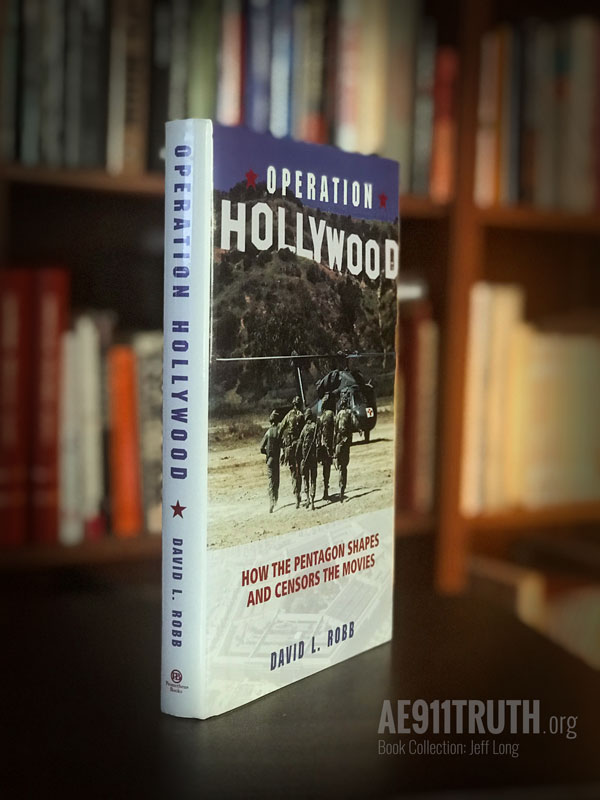 Operation Hollywood: How the Pentagon Shapes and Censors the Movies by David L. Robb
Operation Hollywood: How the Pentagon Shapes and Censors the Movies by David L. Robb
Thus spoke Elmer Davis, Director of the Office of War Information during the Second World War. He was acknowledging how important the entertainment industry had become — even that many years ago — as an institution that profoundly shapes societal attitudes. Only recently, though, have we begun to learn of the extent to which our minds are propagandized by film and television (and now online) drama.
In 2017, Matthew Alford and Tom Secker acquired 4,000 pages of documents from the Department of Defense (DoD) under the Freedom of Information Act (FOIA). Trawling through these documents, they learned that from 1911 to 2017, 814 films received DoD support. When they added 1,113 television titles, that number leaped to 1,947. And when they included individual episodes of serial TV shows and factored in the influence of other government entities, such as the FBI, CIA, and White House, they realized that thousands of entertainment products had been supported in one way or another by the national security state.53
Some of the emails in their FOIA brought to light that even the National Security Agency (NSA) is getting in on the Hollywood act.54
Hollywood, DC - two-part series from Watching the Hawks’ Sean Stone
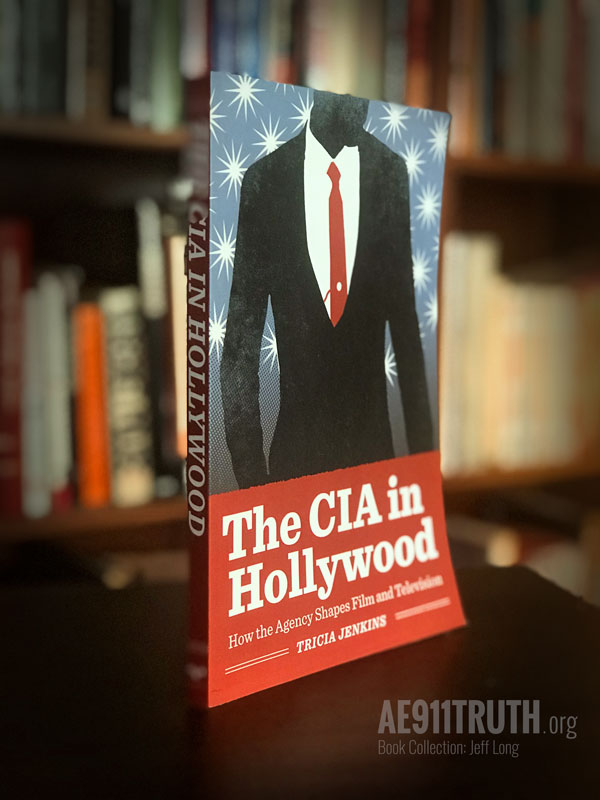 The CIA in Hollywood: How the Agency Shapes Film and Television by Tricia Jenkins
The CIA in Hollywood: How the Agency Shapes Film and Television by Tricia Jenkins
Despite the depth of their probe, Alford and Secker admitted that they could reach no final conclusion. As they explained: “It is impossible to know exactly how widespread this military censorship of entertainment is because many files are still being withheld. . . . However, the documents that were released reveal that the DoD requires a preview screening of any project they support and sometimes makes changes even after a production has wrapped.”55
The pair of researchers learned that producers of films and television shows must, in order to obtain the necessary military equipment and expertise from the DoD and the CIA, sign contracts called Production Assistance Agreements, which commit them to getting military approval of their scripts. In fact, the FOIA documents released to Alford and Secker indicate that the military’s operations in Hollywood are getting more pro-active as the DoD finds ways to get involved during the earliest stages of development, “when characters and storylines are most easily shaped to the Army’s benefit.”56 Accordingly, some films are never made if the producers do not capitulate to the Pentagon or CIA script demands.
"In a rare glimpse inside the defense Establishment’s relationship with Hollywood, the U.S. Department of Energy has acknowledged that actor Charlton Heston has for six years held the nation’s highest-level nuclear weapons security clearance to enable him to narrate classified films and videotapes." - LA Times, Nov 09, 1989
At a U.S. Air Force Joint Intelligence facility located in West Germany in 1990, classified CIA training tapes, narrated by Charlton Heston, were duplicated and distributed by U.S. Air Force intelligence to CIA offices within U.S. embassies and consulates to CIA personnel working under U.S. diplomatic cover throughout stations in Western and Eastern Europe, the Middle East, and Africa.
Moses Gets a Top Secret Security Clearance
The CIA has been influencing movie scripts since the 1940s and 1950s. But it remained an invisible partner and prevented any mention of itself in film and TV until the 1959 production of Alfred Hitchcock’s thriller, “North by Northwest.”57
The Military's Top Secret Hollywood Film Studio in Laurel Canyon
As those of us who understand that 9/11 was a staged event are painfully aware, and as the evidence accumulated by Alford and Secker proves, even documentaries by TV channels such as PBS, the History Channel, and the BBC are produced or influenced with DoD or CIA oversight.58
And as those of us who are working for a peaceful and sustainable world are painfully aware, our efforts are opposed by the powerful men and women running the film and TV industry who promote a pro-war mindset. I agree with the late journalist/activist Tom Hayden’s suggestion:
We have labels for tobacco products and all kinds of across-the-counter brands. Why not require a label stating, “The Central Intelligence Agency provided input and resources to this film. The CIA [or Pentagon] required certain alterations in the script. The final product was controlled by the film’s producers.”59
Now that we have established that the content providers of our entertainment capitulate to the oversight and demands made by the DoD and the CIA, it’s time to find out how the executives and journalists of print and broadcast media, too, were persuaded to cooperate with the CIA.
5 People You Won’t Believe Worked For the CIA — The Corbett Report
Question #1: How were executives of the media brought on board?
During WWII, many journalists worked closely with the Office of Strategic Services, the predecessor of the CIA. When the war ended, these relationships continued. With the perceived threat of “global communism” in the 1940s, 1950s, and 1960s, American publishers willingly cooperated with the Agency. They were performing a patriotic duty, as they saw it. Well-known journalist siblings Joseph and Stewart Alsop were among those only too happy to cooperate. Explains Joseph Alsop: “I’m proud they asked me and proud to have done it. . . . The notion that a newspaperman doesn’t have a duty to his country is perfect balls.”60
When Allen Dulles became Director of the CIA in 1953, he expanded the media operation begun by Philip Graham and Frank Wisner by establishing a highly covert recruiting-and-cover capability within America’s most prestigious news organizations.
Considering the sensitive nature of this undertaking, only the CIA director himself, along with a few chosen deputies, was allowed to contact the heads of news organizations. The CIA asked either for its operatives to be employed as journalists or for permission for its agents to contact accredited journalists and stringers (freelance journalists working on a contract basis with a newspaper or magazine) and ask for favors (see examples below) in return for providing them with good stories.
Hunted by the 'Jackals' — Former CIA Case Officer Philip Agee and Economic Hitman John Perkins
Actually, the relationships formed between successive directors of the CIA and the owners, publishers, and senior editors of news organizations had in many cases started in their much-younger years. Often, they had “gone to the same schools, moved in the same circles, shared fashionably liberal, anti-Communist political values, and were part of the same ‘old boy’ network that constituted something of an establishment elite in the media, politics and academia of postwar America. The most valued of these [news executives] lent themselves for reasons of national service, not money.”61
Investigative journalist Carl Bernstein writes of these deep and long-standing connections:
Among the executives who lent their cooperation to the Agency were William Paley of the Columbia Broadcasting System [CBS], Henry Luce of Time Inc., Arthur Hays Sulzberger of the New York Times, Barry Bingham Sr. of the LouisviIle Courier‑Journal, and James Copley of the Copley News Service. Other organizations which cooperated with the CIA include the American Broadcasting Company, the National Broadcasting Company, the Associated Press, United Press International, Reuters, Hearst Newspapers, Scripps‑Howard, Newsweek magazine, the Mutual Broadcasting System, the Miami Herald and the old Saturday Evening Post and New York Herald‑Tribune. By far the most valuable of these associations, according to CIA officials, have been with The New York Times, CBS and Time Inc. . . . In all, about twenty-five news organizations . . . provided cover for the Agency.62
According to Bernstein, The New York Times’ Sulzberger was especially close to Allen Dulles, so much so that one high-level CIA official quipped, “At that level of contact it was the mighty talking to the mighty.” When the question of cover for a CIA agent came up, Sulzberger and Dulles agreed that the actual arrangements would be made by subordinates in order to give those two “mighty” men plausible deniability.63
Besides the personal bond between Dulles and Sulzberger, the Agency and the Gray Lady were on intimate terms, since the latter boasted the largest foreign news operation of any daily newspaper in the U.S.
Of all the broadcasting media, CBS had the closest connection to the CIA: Its chief executive, William S. Paley, and Dulles “enjoyed an easy working and social relationship.” Yet, as with Sulzberger at the Times, the CBS head “doesn’t want to know the fine points, nor does the [CIA] director,” an unnamed Agency official admits. “Both designate aides to work that out. It keeps them above the battle.”64
When Paley was chairman of the CBS board of directors (1946–1983), one executive whom he designated as his contact to the Agency was Sid Mickelson, CBS News president between 1954 and 1961. Mickelson would later admit:
When I moved into the job I was told by Paley that there was an ongoing relationship with the CIA. He introduced me to two agents who he said would keep in touch. . . . I assumed this was a normal relationship at the time. This was at the height of the Cold War and I assumed the communications media were cooperating. . . .65
Question #2: How were journalists brought on board?
Since journalists and stringers were not part of the CIA’s agreement with the news executives, they were recruited in a different way.
Their relationship with a CIA operative might begin casually with lunch and an exchange of information. Next, the operative might offer the journalist a favor, such as a trip to a country — or access to a government official, notoriously difficult to reach. In return, the journalist would debrief his CIA contact after the trip or the meeting. A few more lunches and a few more favors would typically ensue. Then, after a background check, a CIA deputy director or division chief might offer a formal arrangement, but not until the journalist had signed a pledge of secrecy.
Bernstein elaborates with a few telling quotes:
“The secrecy agreement was the sort of ritual that got you into the tabernacle,” said a former assistant to the Director of Central Intelligence. “After that you had to play by the rules.” David Attlee Phillips, former Western Hemisphere chief of clandestine services and a former journalist himself, estimated in an interview that at least 200 journalists signed secrecy agreements or employment contracts with the Agency in the past twenty‑five years. Phillips, who owned a small English‑language newspaper in Santiago, Chile, when he was recruited by the CIA in 1950, described the approach: “Somebody from the Agency says, ‘I want you to help me. I know you are a true‑blue American, but I want you to sign a piece of paper before I tell you what it’s about.’ I didn’t hesitate to sign, and a lot of newsmen didn’t hesitate over the next twenty years.”66
Journalists who cooperated with the CIA saw themselves as “trusted friends of the Agency who performed occasional services — often without pay — in the national interest.”67 They also benefited greatly from the relationship, because they were able to get much better stories from their CIA handlers in return for their favors than were the journalists who did not play this quid-pro-quo game.
Spooks Turned Spokespersons: US Media Now Filled With Former Intelligence Agents
Question #3: What was the role of the Church Committee in the cover-up of the CIA/media quid pro quo?
Remember, only a small portion of the Church Committee’s task was to investigate the inroads the CIA had made into U.S. media outlets, with the goal of determining if the CIA had abused its power in these dealings. Yet with that small portion the committee had unwittingly opened a can of worms. Once this became clear to committee members, furious negotiations ensued.
Here, in a nutshell, is what transpired: The senators insisted that the Agency provide the committee with information about the scope of the CIA media operation, while the Agency repeatedly dug in its heels to avoid revealing specifics of this highly valued covert operation. Finally, George H. W. Bush, who succeeded William Colby as CIA director in January 1976, agreed to order a search so that files on operations that involved journalists could be pulled. But Bush refused to allow his deputies to hand over raw files, instead directing that they condense each case into a one-paragraph summary. Since there was no consolidation of “journalist files,” the material had to be collected from diverse sources, reflecting the highly compartmentalized nature of the Agency — and of this covert action. Finally, over 400 of these summaries were handed over to the committee. Yet they were disappointingly vague and incomplete to the point where, to quote Bernstein, “They contained no suggestion that the CIA had abused its authority by manipulating the editorial content of American newspapers or broadcast reports.”68
Moreover, his CIA sources told Bernstein that the “400” figure is on “the low side of the actual number who maintained covert relationships and undertook clandestine tasks.”69 As one Agency official explained: “We gave them a broad, representative picture. . . . We never pretended it was a total description of the range of activities over 25 years, or of the number of journalists who have done things for us.”70
Thus, the committee members, all of whom either saw or heard the details of the summaries, concluded that the use of reporters and news executives was a CIA operation of the “first magnitude” and that the number of covert operations involving journalists was far greater than the Agency had revealed.71
Not only could Church Committee senators not verify through these sketchy summaries that the CIA had illegally abused its authority, but they were informed that further analysis of the summaries was impossible.
The committee pressed the CIA harder for specifics. The CIA resisted. The dramatic standoff resulted in a dinner attended by key representatives of each side. There, after a heated discussion, they hammered out a highly unusual agreement: Dr. William Banks Bader, a Church Committee staff member and former CIA and State Department employee, and William Miller, director of the committee staff, . . .
. . . would be permitted to examine “sanitized” versions of the full files of twenty‑five journalists selected from the summaries; but the names of the journalists and the news organizations which employed them would be blanked out, as would the identities of other CIA employees mentioned in the files. Church and [Sen. John] Tower [vice-chairman of the committee] would be permitted to examine the unsanitized versions of five of the twenty‑five files — to attest that the CIA was not hiding anything except the names. The whole deal was contingent on an agreement that neither Bader, Miller, Tower nor Church would reveal the contents of the files to other members of the committee or staff.72
Incidentally, the CIA’s relationship with academics was also part of the committee’s inquiry, which became another problematic issue for the Church Committee to sort out. A description of the true dimensions of the Agency’s relationships with journalists and academics would have caused a furor in the press and in the Senate, resulting in heavy pressure on the CIA to end its use of these assets completely. “We just weren’t ready to take that step,” said a senator interviewed by Bernstein. Thus, the findings of the staff’s investigations into the use of academics were similarly censored.73
In summary, director George Bush, along with other top officials of the CIA, persuaded the committee to restrict its inquiry into the Agency’s media and academia connections and to deliberately misrepresent the actual scope of those activities in its final report. The multi-volume Church Committee report contains only nine pages in which the use of journalists is discussed — and it is in deliberately vague and sometimes misleading terms. It makes no mention of the actual number of journalists who undertook covert tasks for the CIA. Nor does it adequately describe the role played by newspaper and broadcast executives who cooperated with the Agency. Also, the report is silent about the 400 summaries, the 25 sanitized files, and, of course, the five unsanitized files seen by only two members of the committee.74 Later, a 1977 Times investigative series reported that when the CIA-in-the-media program reached its peak in the 1960s, it consisted of more than 800 news and public information organizations and individuals.75
Senator Graham, the Church Committee, and demoralization
The aforementioned Dr. Bader, who had supervised the inquiries into both the media’s and academia’s covert dealings with the CIA and who wrote those segments of the report, concurred with these restrictions. He said he felt he had entered a “gray area” in which there were no moral absolutes. What did he mean?
For one thing, Bader recognized that the CIA’s charter did not prohibit it from being involved with the press or with academics — nor, for that matter, with any other institutions, such as corporations and U.S. diplomats, under whom it had sought cover over the years.
Furthermore, CIA counsel informed the Church Committee that what the CIA did in forming these relationships with the media was neither illegal nor an abuse of power, since permission at the top levels of the news outlets had been willingly granted.76
In addition, Bader concluded that the CIA had gone to considerable efforts to restrict its role to information gathering and cover. Thus, its dealings with journalists had not, in his view, affected the content of news generated by the domestic media, which would have been illegal and a clear abuse of the Agency’s authority.
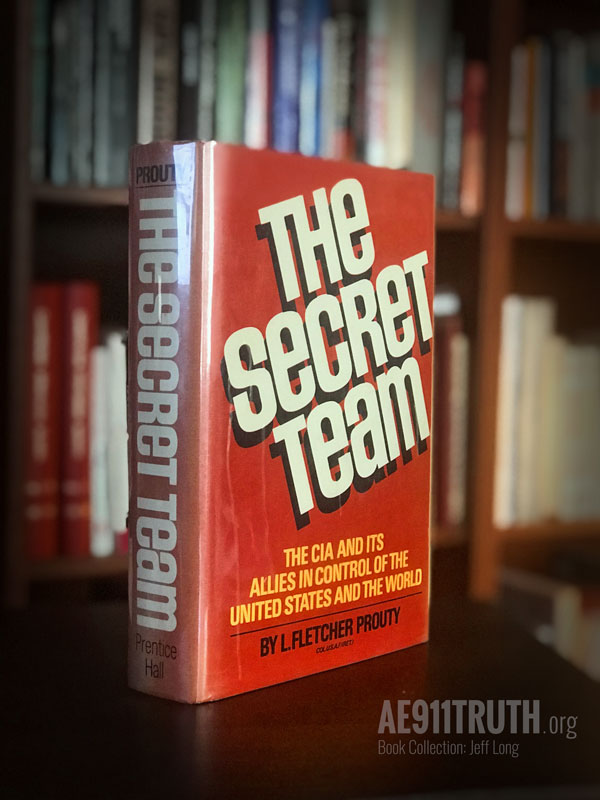 The Secret Team: The CIA and Its Allies in Control of the United States and the World by L. Fletcher Prouty
The Secret Team: The CIA and Its Allies in Control of the United States and the World by L. Fletcher Prouty
With this assessment, Bader had ignored the CIA’s methods of making sure that disinformation was picked up by the U.S. press. Moreover, contrary to his formal conclusion, though likely unknown to Bader at that time — and learned by readers of Part 13 of my series — the CIA sent a secret dispatch (memo 1035-960) in 1967 to CIA agents worldwide directing them to contact journalists and opinion leaders in their respective locales asking for their assistance in discrediting people who were publicly blaming top government officials in the U.S., including in the CIA, for John F. Kennedy’s assassination. In this memo, the talking points delivered by the agents to the foreign media found their way into the American media. The terms “conspiracy theories” and “conspiracy theorists” were used to portray people who did not believe the Warren Commission Report, thus painting these terms and those people with a derogatory brush.
The use of these terms skyrocketed in the media from that point on.77 This highly successful CIA operation — due to the media’s complicity in it — affects us all to this day. Clearly, anyone who questions any official explanation, such as the government’s narrative of 9/11 and of the post-9/11 anthrax attacks, is seen as a “conspiracy theorist” — an individual who must be, by implication, not thinking clearly.
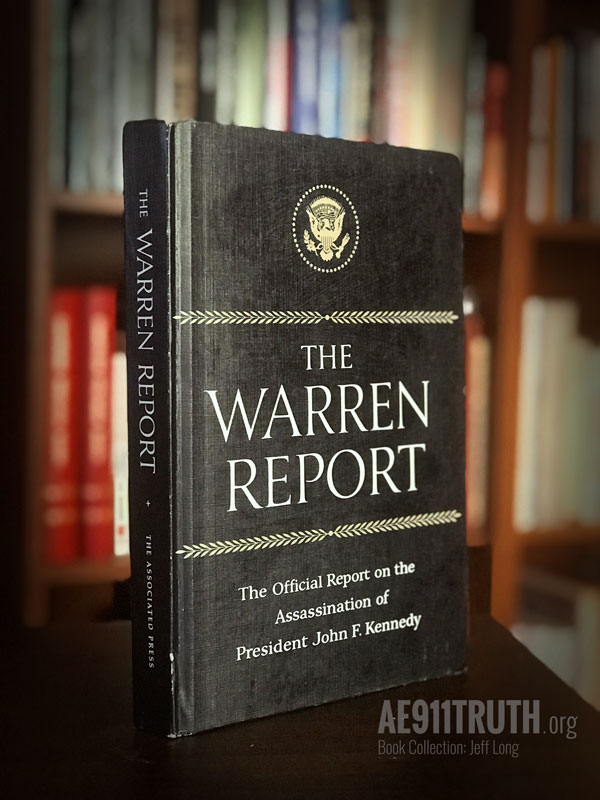 The Warren Report — The Official Report on the Assassination of President John F. Kennedy
The Warren Report — The Official Report on the Assassination of President John F. Kennedy
Furthermore, according to Bernstein’s investigation, the missions of these cooperating journalists and outright operatives included planting disinformation in the foreign press (knowing it would wind up being reported in America’s newspapers, magazines, books, television programs, and radio shows); passing information to CIA foreign assets; conveying false information to foreign officials; bolstering foreign political parties; writing propaganda; and identifying potential CIA assets for the Agency to hire.
To its credit, the Church Committee exposed many illegal activities of the CIA. Yet, as we have seen, the same committee covered up, to a large extent, the CIA’s entanglement with media.
The CIA whistleblowers of that era, by contrast, did just the opposite: They uncovered, through their exposés, the horrible truth about their employer’s nefarious activities.
Let us look at a few examples of men who defected from and/or blew the whistle on some of the unsavory deeds of the ever-secretive CIA.
Victor Marchetti
In September 1969, Victor Marchetti, who had been a special assistant to the Deputy Director of the CIA, resigned. Five years later, just before the Church Committee was convened, his book, The CIA and the Cult of Intelligence, was published by Alfred A. Knopf. President Nixon vigorously attempted to censor it. In fact, this was the first time the federal government attempted to censor a book through court action before it was published.
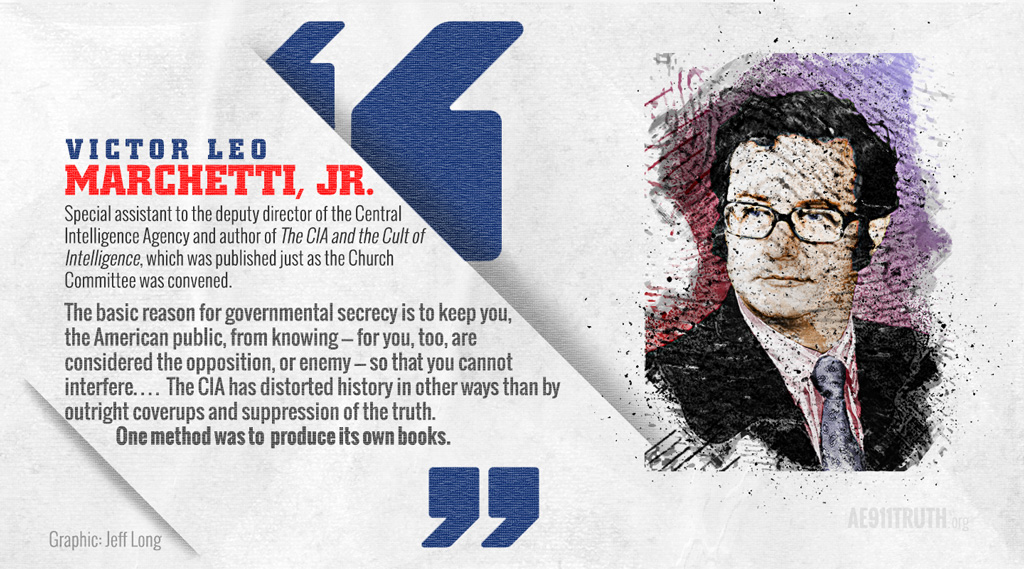
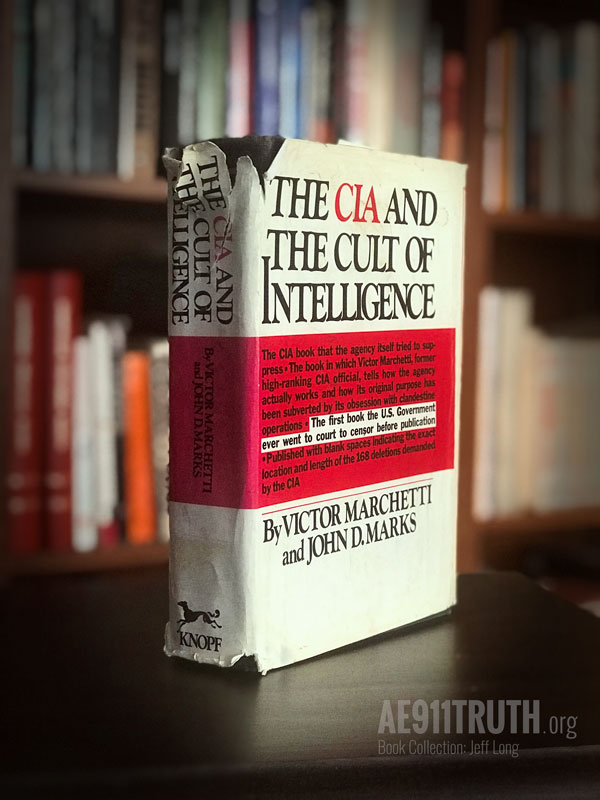 The CIA and the Cult of Intelligence by Victor Leo Marchetti, Jr.
The CIA and the Cult of Intelligence by Victor Leo Marchetti, Jr.
Marchetti clarifies how the CIA, by operating in secret and as a private instrument of the presidency, masterfully creates its own propagandized version of historical accounts — such as the Cuban missile crisis of 1962 and the Gulf of Tonkin hoax that precipitated the Vietnam War.
He also reveals (to my great surprise) how many world leaders and other important political figures were on the payroll of the CIA, irrespective of the political persuasion of that leader.
Marchetti writes:
The real reason for the official secrecy, in most instances, is not to keep the opposition (the CIA’s euphemistic term for the enemy) from knowing what is going on; the enemy usually does know. The basic reason for governmental secrecy is to keep you, the American public, from knowing — for you, too, are considered the opposition, or enemy — so that you cannot interfere. When the public does not know what the government or the CIA is doing, it cannot voice its approval or disapproval of their actions. In fact, they can even lie to you about what they are doing or have done, and you will not know it. [Emphasis added.]
As for the second advantage, despite frequent suggestion that the CIA is a rogue elephant, the truth is that the agency functions at the direction of and in response to the office of the president. All of its major clandestine operations are carried out with the direct approval of or on direct orders from the White House. The CIA is a secret tool of the president — every president. And every president since Truman has lied to the American people in order to protect the agency. When lies have failed, it has been the duty of the CIA to take the blame for the president, thus protecting him. This is known in the business as “plausible denial." . . . [Marchetti goes on to name the presidents and the incidents.]
Thus secrecy is absolutely vital to the CIA. Secrecy covers not only operations in progress, but continues after the operations, particularly if the operations have been botched. Then they have to be covered up with more lies, which the public, of course, can’t recognize as lies, allowing the CIA to tell the public whatever it wishes.
Presidents love this. Every president, no matter what he has said before getting into office, has been delighted to learn that the CIA is his own private tool. The presidents have leapt at the opportunity to keep Congress and the public in the dark about their employment of the agency. . . .
I had come to the conclusion, as a member of the CIA, that many of our policies and practices were not in the best interests of the United States, but were in fact counterproductive, and that if the American people were aware of this they would not tolerate it.
This is the way the CIA sees its mission, the job it was created to do. The CIA is supposed to be involved with everyone. . . . The agency is supposed to have its fingers in every pie, including the Communist one, so that they can all be manipulated in whichever way the U.S. government desires. . . .
The CIA has distorted history in other ways than by outright coverups and suppression of the truth. One method was to produce its own books. [He gives examples.]
He concludes:
[D]emocratic governments fighting totalitarian enemies run the risk of imitating their methods and thereby destroying democracy. By suppressing historical fact, and by manufacturing historical fiction, the CIA, with its obsessive secrecy and its vast resources, has posed a particular threat to the right of Americans to be informed for the present and future by an objective knowledge of the past. As long as the CIA continues to manipulate history, historians of its activities must be Revisionist if we are to know the truth about the agency's activities, past and present.78 [Emphasis added.]
May I be so bold as to declare that we 9/11 “revisionists” are honoring the right of citizens worldwide “to be informed for the present and future by an objective knowledge” of the 9/11 attacks? Without objective knowledge, how can we make good decisions for our present and future? I personally believe that we researchers, activists, and revisionists have thrown a monkey wrench into the government’s official 9/11 narrative, to which we all have been subjected — but to which the Muslim world has been brutally subjected.
Ralph McGehee
Young Ralph McGehee was “gung ho” for America when he joined the CIA in 1952. But his enthusiasm faded with each assignment he was given. Though he did not resign, he became eligible for early retirement in 1977 and took it. In his 1983 book, Deadly Deceits: My 25 Years in the CIA, McGehee expresses his disenchantment with what he saw as a dysfunctional agency. He noted, for example, that propaganda generated by the CIA circles back and contaminates the CIA’s own intelligence files!
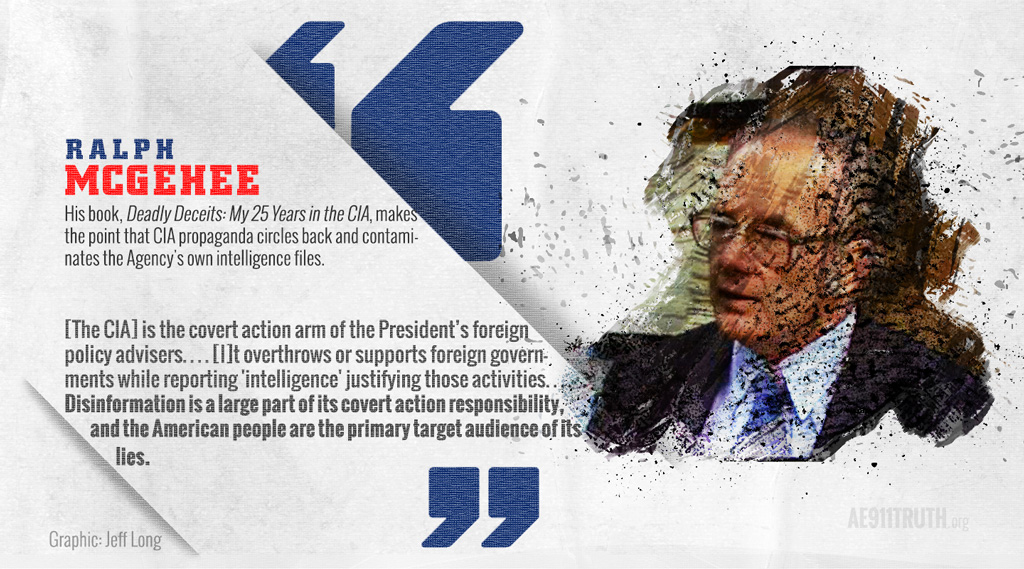
McGehee confirms what we learned above from Marchetti:
The CIA is not now nor has it ever been a central intelligence agency. It is the covert action arm of the President’s foreign policy advisers. In that capacity it overthrows or supports foreign governments while reporting “intelligence” justifying those activities. It shapes its intelligence, even in such critical areas as Soviet nuclear weapon capability, to support presidential policy. Disinformation is a large part of its covert action responsibility, and the American people are the primary target audience of its lies.79 [Emphasis added.]
In Deadly Deceits — which is called “the last of the major exposés of the era”80 — McGehee recommends that the CIA be abolished and that a new intelligence agency without authority to perform covert operations be created.
John Stockwell
John Stockwell is one of the highest-ranking CIA officials to resign and expose the illegal, deeply immoral actions of the Company. During the Vietnam War, he ran a CIA intelligence-gathering post in the Tay Ninh province. Then he was assigned to command the task force of the CIA’s secret war in Angola, a project designed to keep that country destabilized. The reason? So Angola could not industrialize itself. Why prevent Angola from industrializing? So its natural resources (oil, for one) would be saved for the extraction corporations based in the West.81 Before he resigned in December 1976, Stockwell was awarded the CIA Intelligence Medal of Merit for keeping his post open until the last days of the fall of Saigon in April 1975.
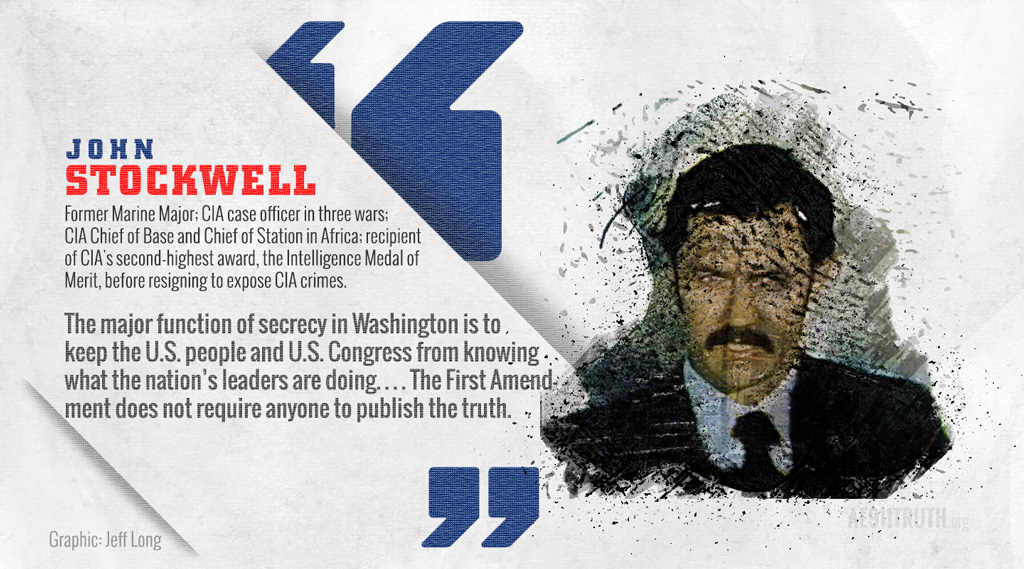
The award — the agency’s second-highest — must have been bittersweet, given that two years later his exposé, In Search of Enemies: A CIA Story, would be published by W. W. Norton and become an international bestseller. Bittersweet, too, given that in this book, Stockwell concludes that the CIA’s covert operations and secret wars not only provide no benefit to the American people but are actually counterproductive to U.S. national security.82
In a hard-hitting, widely acclaimed, and oft-republished/rebroadcast public speech, “The Secret Wars of the CIA,” Stockwell talks about many aspects and actions of the Agency, including its pervasive propaganda and manipulation of the domestic press. So, once again, we have affirmation that the CIA puppeteered the media.
But let’s back up a bit in his story: While still in the CIA but souring on its role worldwide, Stockwell wondered if people in high places in the U.S. government had good reasons for commanding the CIA to orchestrate so many atrocities around the globe — atrocities that killed millions of Third World peoples and displaced many millions more who had the misfortune of living in the CIA’s latest war zone. (He called these covert actions the “Third World War.”)83 Did they know things that he, as a lowly agent in the field, did not know? Things that would justify the mass slaughter and displacements? He got his chance to find out when he was handed the aforementioned Angola assignment:
I wanted to know if wise men were making difficult decisions based on truly important, threatening information, threatening to our national security interests. If that had been the case, I still planned to get out of the CIA, but I would know that the system, the invisible government, our national security complex, was in fact justified and worth while. And so I took the job. . . . What I found, quite frankly, was fat old men sleeping through sub-committee meetings of the NSC in which we were making decisions that were killing people in Africa. I mean literally. . . .
Now, the most significant thing that I got out of all of this, in addition to the fact that our rationales were basically false, was that we lied. To just about everybody involved. One third of my staff in this task force that I put together in Washington, commanding this global operation, pulling strings all over the world to focus pressure onto Angola, and military activities into Angola, one third of my staff was propagandists, who were working, in every way they could think of, to get stories into the U.S. press, the world press, to create this picture of Cubans raping Angolans, Cubans and Soviets introducing arms into the conflict, Cubans and Russians trying to take over the world. . . .84
Stockwell went on to say that every false statement about Angola made to the UN Security Council, to the press, or to Congress originated in the National Security Council subcommittee on which he sat. To counteract this propaganda, he advises us to turn off our televisions.
I urge you to read. In television you get capsules of news that someone else puts together what they want you to hear about the news. In newspapers you get what the editors select to put in the newspaper. If you want to know about the world and understand, to educate yourself, you have to get out and dig, dig up books and articles for yourself. Read, and find out for yourselves. As you’ll see, the issues are very, very important. . . .
You have to be asking yourself, why are we destabilizing 50 corners of the troubled world? . . . It is the function, I suggest, of the CIA, with its 50 de-stabilization programs going around the world today [1986], to keep the world unstable, and to propagandize the American people to hate, so we will let the establishment spend any amount of money on arms. . . .
Part of a de-stabilization is propaganda, to dis-credit the targeted government. . . . What you have to understand is the politics of paranoia. The easiest . . . buttons to punch are the buttons of macho, aggression, paranoia, hate, anger, and fear. . . .
Why arms instead of schools? . . . They can make gigantic profits off the nuclear arms race because of the hysteria, and the paranoia, and the secrecy. And that’s why they’re committed to building more and more and more weapons, is because they're committed to making a profit. And that’s what the propaganda, and that’s what the hysteria is all about.85 [Emphases added to the above paragraphs of Stockwell’s speech.]
Could this be any clearer? Is it not obvious how much Stockwell’s words apply to us today? There is the fear generated by the psychological operation of 9/11. There is the propaganda spewed from the mainstream and even much of the alternative media. There is the hysteria of terrorism and the bogus “war on terror.” And there are the millions in profits made by the military-industrial complex. Will we ever learn?
Question #4: Are the media and the CIA still in bed with one another?
As you will recall, this is the question I was unable to ask panelist Shane Bauer, because Hedrick Smith kept interrupting me. We cannot depend on the Church Committee report to answer this query, because that report remained mum on whether or not the CIA would continue to consider the press fair game for infiltration.86
Instead, we will have to look at history to discover a likely answer.
Until 1973, the CIA enjoyed using journalists for a variety of clandestine missions. Starting that year, in response to the public disclosure that the Company had covertly employed American reporters, CIA Director William Colby scaled down the operation. In public comments, he gave the impression that the Agency had made only minimal use of journalists and that these contacts had been of limited importance. As we have seen, his inferences were not at all true, as the utilization of accredited reporters and the utilization of media companies as cover for agents had long been considered a mutually beneficial relationship of the “first magnitude,” involving hundreds of journalists as well as hundreds of media vehicles, which the CIA owned either in full or substantially.87
Colby severed relationships with probably as many as a hundred relatively inactive journalists between 1973 and 1976. He then set about convincing the press, Congress, and the public that the CIA was no longer in the news business. But according to the Agency officials whom Carl Bernstein interviewed: Colby had in fact thrown a protective net around his valuable intelligence in the journalistic community. He ordered his deputies to maintain Agency ties with its best journalistic contacts while severing formal relationships with many regarded as inactive, relatively unproductive or only marginally important.88
Meanwhile, influential CIA operatives who had been placed on the staffs of some major newspaper and broadcast outlets were told to resign and become freelancers, thus enabling Colby to assure concerned editors that actual members of their staffs were not CIA employees.89
Based on Colby’s concern that operatives might have their journalistic cover blown, these valuable agents were reassigned to jobs with proprietary foreign news outlets — in other words, news organizations that were in fact fronts secretly funded and staffed by the CIA. Colby told The New York Times and the Washington Star after many of these personnel shifts were made that only “some three dozen” American newsmen were left “on the CIA payroll.” Predictably, his assertion was contradicted by high-level CIA sources, who told Bernstein that the Agency still had ties to 75 to 90 journalists of every description — from stringers to executives. Likewise, “according to an unpublished report by the House Select Committee on Intelligence, chaired by Representative Otis Pike (D–New York), at least fifteen news organizations were still providing cover for CIA operatives as of 1976.”90
Consequently, we clearly see that the CIA is not a truth-telling agency — that is, not when the truth doesn’t serve its purposes.
As we learned earlier, Colby was succeeded as director by George H. W. Bush on January 26, 1976. Bush issued a new policy: “Effective immediately, the CIA will not enter into any paid or contractual relationship with any full‑time or part‑time news correspondent accredited by any U.S. news service, newspaper, periodical, radio or television network or station.”91
Nevertheless, from the other side of its mouth, the Agency acknowledged that this new policy would result in termination of less than half of the 50 U.S. journalists it acknowledged were still affiliated with the CIA. Furthermore, according to the text of the announcement, the CIA would continue to welcome voluntary cooperation of journalists, permitting pro bono relationships to remain in place.
Furthermore, when Bader attempted to get more information about the Agency’s then-current program with the media, he ran into a stone wall. “Bush has done nothing to date,” he told associates. “None of the important operations have been affected in even a marginal way.”
Thus, journalists doing favors for the CIA, paid or unpaid, and CIA agents working for major news organizations, press or broadcast, were too valuable for the CIA to relinquish, whether this secretive back-scratching be formally called “Operation Mockingbird” or not. To think otherwise would be the height of naïveté.
It would be equally naïve to believe that only the CIA was manipulating the media. As can be discerned by simply listening to the mainstream news during any conflict, the DoD was also controlling the news that reached the public. For example, in 2000, World Net Daily (commonly called WND) reported that CNN, the most watched and widely viewed news outlet in the world, had been hiring army psychological operations personnel as journalists. Known as the Fourth Psychological Operations Group from Fort Bragg, North Carolina, one of the main functions of its “almost 1200 soldiers and officers is to spread ‘selected information,’” otherwise known as propaganda. Conflicts in which these psyop personnel were involved included “the Gulf War, the Bosnian War and the Kosovo crisis.”92
Increase of media manipulation after 9/11
In the 21st century, two factors are primarily responsible for bringing about a new era of expanded manipulation of the media by the government, according to Nick Davies. First factor: the advent of the internet. Second factor: the event we refer to simply as 9/11.
The internet’s advent and the September 11, 2001, attacks have provided the Pentagon and the CIA with a powerful motive to link their operations in order to massively increase their joint disinformation campaigns, for the purpose of molding opinions and attitudes to their subversive agendas. The official narrative of 9/11 gave the U.S. military a new kind of war and thus a new reason to ramp up its propaganda efforts. For example, the DoD has inserted into the worldwide web a plethora of fake sites and blogs to spread that disinformation.93
Davies explains:
The new development, since the attacks of September 2001, is the construction by the US government and its allies, alongside the propaganda activity of intelligence agencies, of the new apparatus of what they are calling ‘strategic communications’ [sometimes called “perception management”]. It is a project of extraordinary ambition and yet it has been developed almost unnoticed in the public and political domain, almost without debate about its proper boundaries. . . . Its chief architect is the Pentagon. . . . It has set out its plans in a series of ‘doctrine’ papers, some of them published and some of them released under the US Freedom of Information Act. [These papers] show that the Pentagon’s key contribution has been to increase its own role in military ‘information operations’, known as IO. . . . [The Pentagon] has declared information operations to be a new ‘core competency’, formally designating it as a fifth arm of the military, with the same status as army, navy, air force and special operations. The aim . . . is ‘to dominate the information battlespace’.94 [British punctuation.]
Additionally, with the passage of the Smith-Mundt Modernization Act of 2012, which repealed the 1948 ban on U.S. government dissemination of propaganda to its own citizens, the Department of State and the Broadcasters Board of Governors (BBG)95 have been granted essentially unrestricted authority to violate Americans’ civil liberties and constitutional rights — all with the pretext of countering potential domestic terrorism. One particularly concerning aspect of the Act allows State and the BBG to spew out propaganda that is unattributed, thus preventing U.S. citizens from learning its source.96
Declassified — YouTube Playlist of Mini-Documentaries by Truthstream Media
Well, there we have it: The most prominent modern disinformation campaign is the fake narrative about 9/11 and the ensuing “war on terror.” This monstrous deception has contributed to recreating the conditions of the Cold War, and therefore, the rationale for a massive increase in propaganda, with the internet providing a powerful new tool to proliferate deception.
The intelligence agencies, the Pentagon, the State Department, and the BBG now have carte blanche to deceive the public through (1) “cognitive infiltration”97 (fanciful, unsubstantiated theories that are widely disseminated largely via new internet technologies that are designed to muddy the well of actual evidence), (2) “front groups” (fake blogs, fake websites, fake organizations, fake grassroots activists), and (3) propagandistic films covertly produced by these government agencies, leaving viewers ignorant of their sources.
Indeed, it has become a tall order for 9/11 skeptics to discern the disinformation and to keep their movement as unspoiled as possible from the federal government’s underhanded intentions and deeds.
But persevere we must, by continuing to do careful research, to analyze all available data, and to present irrefutable facts, if we are to lay bare the lie of 9/11. Of the many reasons for making this effort, the most important is that millions of innocent humans have already had their lives taken or devastated by the 9/11-instigated wars. We all must do our part to stop this madness.
Dr. Udo Ulfkotte
In case there is room for doubt that the CIA is still tightly entwined with the media and that the media, to this very day, dutifully cooperates with the CIA to keep us all in a manufactured reality — a fantasy world — let’s consider a recent exposé by a most courageous journalist.
On September 29, 2014, Dr. Udo Ulfkotte, went public on RTQuestionMore98 about his longtime cooperation with the CIA. Ulfkotte, a journalist for 25 years and former assistant editor of the Frankfurter Allgemeine Zeitung, one of Germany’s largest newspapers, told his interviewer that throughout his career he had had “non-official cover” with the Bundesnachrichtendienst, the German foreign intelligence agency, founded by — and a sister to — none other than the CIA. The basis of his success, said Ulfkotte, is that he cooperated with and did favors for the CIA — in return receiving secret information that he could employ in ways that advanced his career. The same was true of certain other journalists, Ulfkotte said. Sometimes the CIA even provided fully written articles for the journalists, who simply had to sign their own names to make it appear that they were the authors.
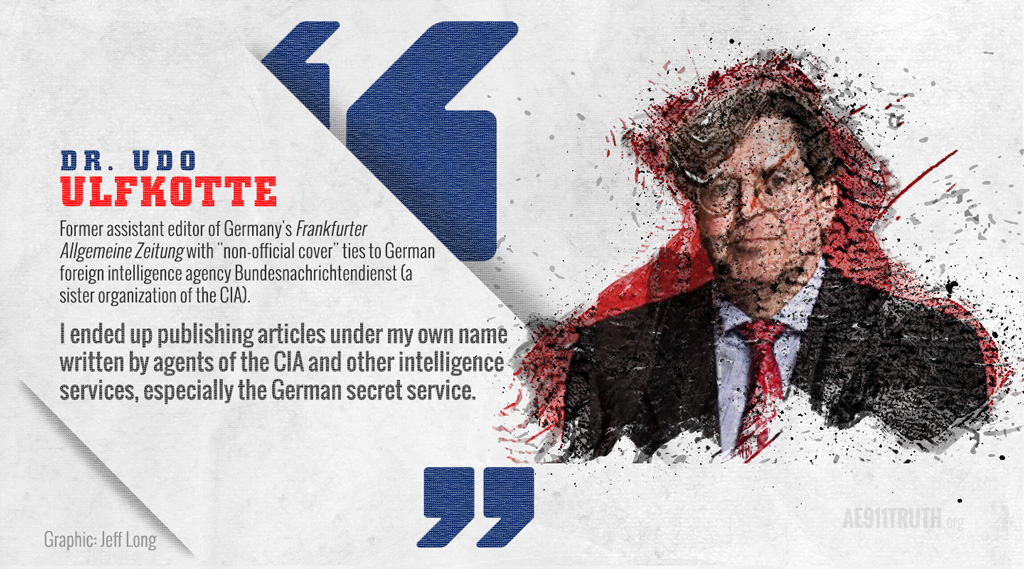
When asked if Germany is the only country that has gone along with the CIA’s infiltration, Ulfkotte replied:
No, I think it is especially the case with British journalists, because they have a much closer relationship. It is especially the case with Israeli journalists. Of course with French journalists. . . . It is the case for Australians, [with] journalists from New Zealand, from Taiwan, well, there [are] many countries . . . like Jordan for example. . . .99
The question arose: What would happen if he declined the requests by the intelligence agencies? Ulfkotte replied with a story about a helicopter pilot working for the German roadside rescue company “Yellow Angels.” When the pilot refused to accept the offer of “non-official cover” for the Bundesnachtendienst, he was summarily fired. Later, though, a German court ruled in his favor.100
CIA operatives had “educated” Ulfkotte to always write pro-American, pro-European, and anti-Russian stories. That mandate to manipulate the news finally became intolerable to him. So he came forward with his exposé because he feared that certain people in high places were agitating for war with Russia and that journalists, by conforming to CIA pressure, were playing a role in this potentially horrendous crime against humanity and the planet.
His personal transformation went through several phases, but likely the most momentous contribution to his moral conversion was his discovery of the role that German-made poison gas had played in enabling Saddam Hussein to kill 5,000 Kurds — a sordid fact that was never published in Ulfkotte’s newspaper.101
Dr. Udo Ulfkotte’s book, Gekaufte Journalisten, translated as Bought Journalists, was largely ignored by mainstream German media.
The book was finally published in English as Journalists for Hire: How the CIA Buys the News four months after he died from his fourth heart attack on January 13, 2017, at the age of 56. Not only was this English version delayed in publication until 2017, but it is “currently unavailable” at Amazon and nearly impossible to find otherwise — or afford if one does find it.102
Author Douglas Valentine’s detailed historical study of the CIA supports Ulfkotte’s testimony. Valentine declares unequivocally that the CIA is indeed still controlling broadcast, print, and now electronic media and proposes the reasons for this propaganda:
The CIA advances the unstated goals and policies of the United States government, as opposed to the State Department, whose propaganda is promoting its started objectives. . . . The purpose of CIA propaganda is to create plausible deniability: to hide or disguise the fact that it is the source of a particular piece of misinformation designed to mislead the American public. . . . But mostly they are trying to adjust American public opinion to support intervention abroad: arming Israel and Saudi Arabia and Egypt, to keep the oil flowing.103
To emphasize the overarching role of the CIA, he makes this point: “It doesn’t matter whether it is the DEA, CIA, FBI or the military. These people all know what to do. They mostly do it [propaganda] for their own different bureaucratic reasons, but the CIA ultimately controls the final product.”104
Question #5: How is the CIA able to act with such impunity?
As we have learned from whistleblowers Marchetti, McGehee, and Stockwell, the CIA’s criminal activities are not restricted to planting disinformation in the news to sway opinions both foreign and domestic, nor with outright censorship of news it wants suppressed. As egregious as these actions are in a country whose citizens value a “free press” and the other liberties enshrined in the Bill of Rights, CIA meddling in and manipulation of the media is only the tip of the iceberg, so to speak. Below the surface is criminality massive enough to sink many a Titanic.
In his essay “Crimes and Silence,”105 independent investigator John Kelly says that, based on his analysis of recorded CIA activities, the Agency easily commits 100,000 very serious crimes each year around the world. To bring home to you the enormity of this number, I have calculated the approximate number of crimes that the CIA is committing in the time it takes you to read this essay segment. The answer: Conservatively, more than one hundred. Not trivial crimes, like petty larceny, but crimes against humanity: terrorism, assassinations, torture, and other egregious violations of human rights.
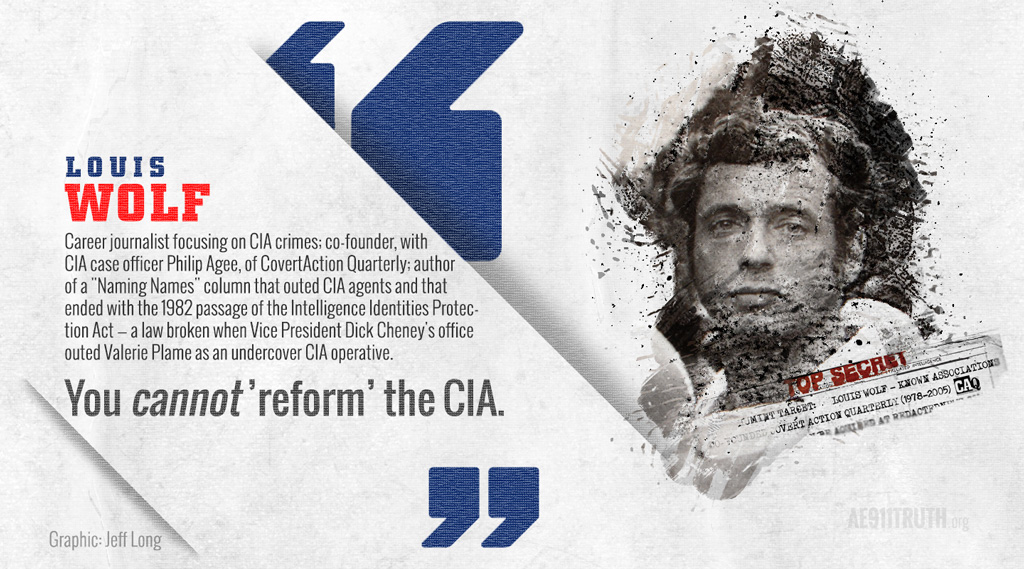
Louis Wolf was a career Washington, D.C., journalist who focused on CIA crimes. In 1978, Wolf and former CIA case officer Philip Agee co-founded CovertAction Information Bulletin (later called CovertAction Quarterly and now published online as CovertAction Magazine with Chris Agee). Wolf and Agee were known for their CIA agent-outing column, "Naming Names," which ended in 1982 when the new Intelligence Identities Protection Act made it illegal to reveal the name of any undercover officer. That law was later broken when Vice President Dick Cheney conspired with I. Lewis "Scooter" Libby and Karl Rove for political purposes to out undercover CIA operative Valerie Plame, an agent with Non-Official Cover (NOC) who was with the Operations Directorate of the CIA — the clandestine unit where undercover officers work.
Upon being informed by the CIA about its own criminal operations, members of the 1996 House Intelligence Committee seemed unfazed by the immorality, much less illegality, of said operations. They expressed a similar lack of concern over the impact of the CIA’s actions on U.S. diplomatic relations with other countries. Instead, their main concern was that agents might be caught, arrested, and prosecuted, thus potentially embarrassing the country and the President.106
The Senate Intelligence Committee not only mirrored the House Intelligence Committee’s lack of concern, but it actually encouraged the Agency’s perfidy by proposing “a bill that would immunize CIA offenders who violate treaties and international agreements while following orders. . . . The bill passed in both chambers and was signed into law by President Clinton on December 27, 2000.”107 Though this law, Section 308 of the Intelligence Authorization Act for Fiscal Year 2001, was designed to apply only to future agreements, Kelly reckons that “if recent history is any indication, the CIA will apply it broadly and retroactively. This would mean exempting itself from all international law, from the laws of other countries,” and from other U.S. laws.108
CIA immunity from prosecution effectively means that, contrary to the stated intentions of the framers of the U.S. Constitution, an entity within the executive branch of the federal government is permitted by U.S. law to be lawless, roving the world and instituting its own foreign policy. Our system is based on checks and balances for good reason: to prevent excessive power of any one governmental entity. With the passage of Section 308, the CIA, as an arm of the executive branch, has no lawful check on its actions in the U.S. or the rest of the world.109
As if this weren’t bad enough, both the House and Senate committees complied with the CIA’s pressure to lift restrictions on hiring informants known as “unsavory characters” and, in fact, recommended as the highest priority the “aggressive recruitment” of these “terrorist informants who have human rights violations in their background.” [Emphasis added.]
Could it get any worse than that? Apparently so. According to Kelly, the CIA’s investigation of 1,000 of its own shady informants “revealed that 90 percent of the information they provided proved to be ‘useless.’” It’s no surprise to learn from Kelly that the CIA actually uses these so-called informants as terrorists.
Despite such CIA treachery, we hear only “profound silence from the press,” Kelly observes. “There has been no reporting, let alone analysis, of this story. There have not even been questions from the press regarding the rationale for using terrorist “informants” or how they can be controlled.”110
If journalists were to ever dare question the CIA’s rational for committing over 100,000 extremely serious crimes each year, they could begin by asking if there is any proof that these unlawful actions aid the Agency in promoting national security. (They might even ask what the term “national security” actually means!). While the objectives the CIA hopes to achieve by committing these offenses can be argued, Kelly says, “there is no doubt that they do not serve national security.”111 [Emphasis added.] Not surprisingly, his conclusion echoes the words of the CIA whistleblowers we have already met.
While they’re at it, reporters would also do well to investigate whether any American citizens have ever been targets of CIA crimes — including assassination. The answer from John Kelly is a resounding “yes.” In fact, he investigated and authored one such account. In 1984, the American Broadcasting Company (ABC) hired Kelly to help produce his story about a CIA assassination attempt of an American. After the story aired, the CIA pressured ABC into making an on-air “clarification,” which Peter Jennings dutifully delivered, though continuing to stand by the story. Not satisfied with that “clarification,” the CIA pushed harder, until Jennings, despite having zero evidence to support the CIA’s claim of innocence, agreed to announce in a third broadcast, “We have no reason to doubt the CIA’s denial.”112
Still not appeased, the CIA filed a complaint with the Federal Communications Commission (FCC), charging that ABC had deliberately distorted the news. Its charge drove down the price of ABC stock. At that point, CIA front company Capital Cities Communications (which CIA Director William Casey had co-founded) maneuvered to buy ABC for a bargain. Cap Cities/ABC Inc. subsequently sold 53 of its cable TV systems to the Washington Post Company,113 which, as we learned earlier from Debra Davis’ book Katherine the Great, already had a longtime collaborative relationship with the CIA.
The remainder of Cap Cities/ABC was eventually acquired by The Walt Disney Company, itself heavily tied to the military-industrial complex. It was re-branded as Disney-ABC Television Group in 1996.114
Click the image to view full-size visualization 2500 x 3017
Infographic developed by TitleMax
The result of the takeover? John Kelly’s contract with ABC was not renewed, the entire investigative unit of the broadcasting company was dispersed, and the ABC news commentator of the originally aired program was assigned to cover beauty pageants! The L.A. Weekly “insightfully” speculated that Casey’s actions against ABC might have been intended to make the TV broadcaster less likely to run stories critical of the CIA.115
That appropriation of ABC took place in the mid-1980s. And it all started because ABC reported on a CIA assassination attempt of an American citizen. Now, in this post-9/11 “war on terror” era, with the media still firmly under its “protective” wing, the CIA is even bolder and more overt in pursuit of its victims than it had been in years past — especially when it comes to individuals targeted for assassination, such as American citizens whom the Agency suspects are working for Al Qaeda.116
Not only is the CIA flouting international law by carrying out illegal assassinations in foreign countries, but, says Kelly, it is allowing the press to put its operations (crimes) on the record. For example, The Washington Post normally submits advance copies of its articles to the CIA for censorship, and yet in today’s world, the CIA is less likely than in days of yore to withhold the details of its unlawful activities from the press.117
The CIA was established under the National Security Act of 1947. Its charter authorized it to “distill and write up all available intelligence, and offer it to political leaders in a manageable form. The Act gave the CIA five functions, four of them dealing with the collection, coordination, and dissemination of intelligence from open sources as well as espionage.”118
And though the CIA charter established no authority for covert operations or for black propaganda, its general counsel, Lawrence Houston,119 points out that the fifth function allowed the CIA to “perform such other functions and duties related to intelligence affecting the national security as the National Security Council may from time to time direct.”120 The CIA’s liberal interpretation of that vague language “turned the CIA into the personal, secret, unaccountable army of the president,”121 according to author and former consultant to the CIA Chalmers Johnson (echoing Victor Marchetti).
Bill Schaap was a military and civil rights lawyer; a co-founder and former co-editor, along with partner Ellen Ray and friend Louis Wolf, of CovertAction Quarterly; an editor of the magazine Lies of Our Times; a co-editor of Bio-Terror: Manufacturing Wars the American Way; and an attorney for AE911Truth. Along with Ellen Ray, Schaap helped run Sheridan Square Press, best known for publishing New Orleans District Attorney Jim Garrison's On the Trail of the Assassins, the book that would later form the basis for Oliver Stone's film JFK. Schaap passed away in 2016.
The same liberal interpretation also opened the door to “findings.” This term refers to the presidential practice of signing orders “finding” that individuals or groups threaten U.S. national security, which naturally requires CIA attention. When the President issues a finding, he is supposed to notify Congress. In practice, though, the CIA creates the finding as a fait accompli and sends it to the President for his signature. And in many cases, the CIA has carried out covert operations without even bothering to secure findings first.122
CIA counsel Houston admits that this whole process is illegal — that no one in any branch of government can unilaterally launch a secret operation on a dubious “finding.” Even Congress, if it were notified of a finding, is not legally permitted to authorize any criminal operations, no matter who the would-be perpetrator.123
Thus, it is accurate to say that from its inception, all Central Intelligence Agency operations have been illegal and all who carried out these illegal operations have never been held to account. In 1954 the CIA made its first attempt to gain statutory immunity from prosecution. But that immunity was not granted until Section 308 of the Intelligence Authorization Act for Fiscal Year 2001 was signed into law.
The mainstream media neither covered this stunning new law nor its repercussions — effectively an admission that “the Constitution does not apply to the CIA or any US intelligence personnel, including lowly agent-assassins.”124 Compounding that disturbing fact is the ominous implication that, if the CIA has its way, journalists will one day be prevented by law from ever being able to write about the Agency’s legal immunity for past illegalities and its immunity from all future illegal actions.
How so? John Kelly explains:
As part of the 2001 Intelligence Authorization Act, Congress passed the first “Official Secrets Act” criminalizing certain press coverage of the CIA. At the last moment, Clinton was embarrassed into vetoing the act. But the CIA said it would go back to the drawing board and continue “crafting” newer versions.125
Only hours before this essay was approaching publication, I learned that the CIA has indeed gone back to the drawing board, directing its aim toward the Intelligence Identities Protection Act (IIPA) of 1981. The Agency has approached senators and representatives with language that would expand the definition of protected covert agents by including those agents who operate not only without but also within the United States. If the CIA has its way, reporters in this country will be vulnerable to prosecution for reporting on “torture, mass surveillance, and other crimes against the American people.”126
Ominous indeed. The lethal combination of impunity and censorship in the hands of “Big Daddy,” as Hedrick Smith sarcastically referred to the CIA, is not to be taken lightly. It smacks of George Orwell’s 1984.
Chinese artist Ai Weiwei
Press censorship of CIA misdeeds also smacks of the current state of China’s media censorship. Since making some reforms, the Communist Party of China now allows private media to function in the country, alongside its state media. Nonetheless, censorship of all media, including the internet, on sensitive topics is stringent. And punishment for conveying information not in line with the official narrative is harsh. As a result, the vast majority of Chinese born after 1980 have never read or heard of the “1989 Tiananmen Square Protests,” known in China most commonly as the “June Fourth Incident.” I was shocked to learn how successful the state’s suppression of this event has been.
The Western media, on the other hand, have used the Tiananmen Square protests as a political propaganda weapon against China. According to The Corbett Report, most of us who depend on the Western media for our news continue to be misinformed about the protests. Notably, we were not told that the CIA was behind the scenes — provoking and, to a degree, co-opting what was a genuine and massive student uprising. The full story is replete with CIA front groups and provocateurs, whose actions were most likely designed to achieve a “color revolution” and institute regime change in China.127
The point here is that we Westerners are being propagandized without even knowing it. So, of course, we buy the disinformation, no questions asked. China’s citizens, on the other hand, are propagandized openly by the state media.128 Their awareness of this fact is why one of the reforms they desperately sought in 1989 was freedom of the press.
But the CIA is not content with propagandizing the entire globe, including its own country’s citizens, by surreptitiously controlling the media. No, this corrupt cabal, by reversing the tables and playing the victim card, is attempting to make criminals of any and all journalists who report on its misdeeds.
Are we Americans under the illusion that our media could not one day be openly suppressed like the Chinese media? Do we honestly think the CIA is not capable of — and bent on — dragging society down the slippery slope toward ever more blatant forms of fascism? If so, we had better think again, because that will be the eventual outcome if the CIA succeeds in criminalizing “certain press coverage” of its activities.
Again, it cannot be emphasized enough: Today, news coverage of the CIA is de facto forbidden. Reporters dare not breathe a word about the CIA’s actions in any part of the world, much less analyze, explain, or opine on them. The result? Without our being aware of it, our basic beliefs have already been, and will continue to be, influenced and molded by this rogue government agency.
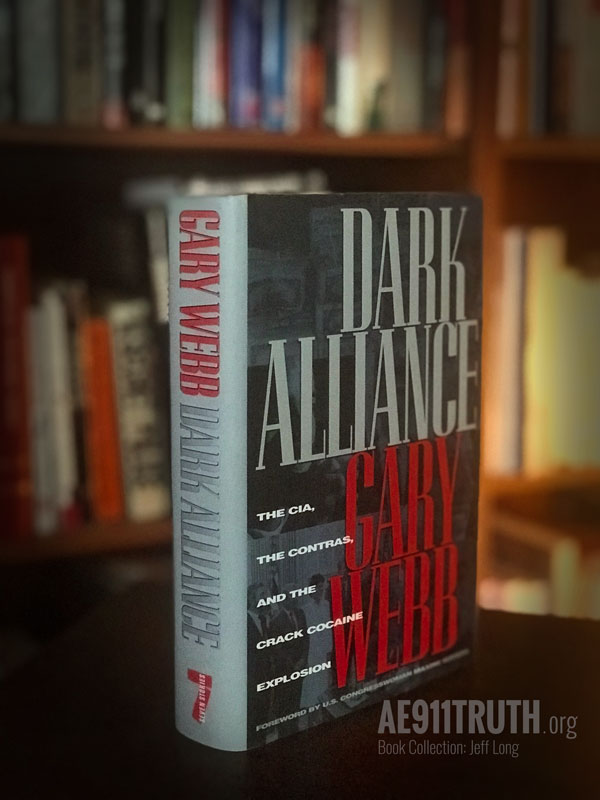 Dark Alliance: The CIA, the Contras, and the Crack Cocaine Explosion by Gary Webb
Dark Alliance: The CIA, the Contras, and the Crack Cocaine Explosion by Gary Webb
Occasionally, journalists stand up to this bully. When they do, though, the rest of the big boys in the media side with the CIA in killing the messenger — the brave journalist and his employer — either by squelching the story before it’s published or aired or, if it does see the light of day, by denouncing the truth-teller, denying the truth he has exposed, and doing their utmost to make the story disappear from the annals of history. These suppression tactics were demonstrated in Part 21, where we learned from undercover DEA agent-turned-journalist Michael Levine about his experiences with CIA interference and censorship when he tried to stop drugs coming into the U.S.
Pulitzer Prize-winning investigative reporter Gary Webb apparently crossed a line that the CIA could not tolerate with his 1996 “Dark Alliance” series on CIA drug-running. The majority of the media sided with the CIA in ruining Webb’s reputation as well as that of the San Jose Mercury News, which eventually succumbed to pressure to retract the series. Webb lost his life in the process. The official jury is still out on whether he committed suicide or was “suicided” by the CIA — with two gunshots to the head.129 Either way, Webb’s story has had a chilling effect on any and all journalists and editors inclined to step out of line.130
Meet Gary Webb, the man who knew the secrets of the CIA’s "dark alliance." From the jungles of Nicaragua to the mean streets of south-central LA, Webb’s groundbreaking investigative journalism uncovered a scandal so huge that the story could not be allowed to remain exposed. Honor the memory of this intrepid reporter by exploring the brave life and the suspicious death of Gary Webb. Corbett Report Show Notes.
These stories illustrate the creeping nature of censorship in the U.S., though we have not yet been subjected to the blatant, in-your-face suppression of truth seen in China. We are fortunate that we still have brave, independent online journalists who report on illegal CIA activities and on that “ultimate third rail” issue, 9/11. We must do our utmost to keep those information channels open if whatever openness we have left in our society is to survive.131
Conclusion
As I established in Part 21, the silence of the news media is the primary reason why good people are silent about 9/11. Had journalists done their job by questioning the anomalies and incongruities of the official story and by examining the most salient evidence that contradicts it, the public would not be battling the psychological forces that I have addressed in the other segments of this series. (The media’s silence aside, these psychological forces are critical factors we must take into account if we are to understand why good people are silent when confronted with information that contradicts their worldview on any subject. If you have not read the earlier installments, they start here.)
Now that we have established that the CIA is still directing and still embedded in our media, and now that we have read the testimonies of courageous whistleblowers about the illegality and inhumanity of the CIA as it perpetrates covert operations around the world, we must ask ourselves: Is it any wonder that both the mainstream media and most alternative media refuse to touch the “ultimate third rail” issue of 9/11?
Not according to Linda Pease, who writes about another third rail issue, the assassination of Robert F. Kennedy. Her in-depth study of this tragedy led her to write the book, A Lie Too Big to Fail, in which she asserts:
Until the people can be made aware of the CIA’s role in slanting the truth on topics of great importance, America’s very survival is in jeopardy. . . . We’ve come perilously close to losing democracy itself because of fake, CIA-sponsored stories about our history. Should America ever become a dictatorship, the epitaph of our democracy must include the role the mainstream media, by bowing to the National Security state, played in killing it.132
In the next installment we will consider the case to be made that, even if the CIA were to be abolished, there is reason to believe that the corporate-owned media, due to its very structure, would continue to censor the taboo 9/11 topic and other controversial topics — especially those that affect U.S. foreign policy and corporate profits.
Endnotes
1 See https://www.eisenhower.archives.gov/research/online_documents/farewell_address/Reading_Copy.pdf and https://www.youtube.com/watch?v=8y06NSBBRtY.
2 Formally known as the Select Committee to Study Governmental Operations with Respect to Intelligence Activities.
3 See http://www.shanebauer.net/about">http://www.shanebauer.net/about..
4 See http://hedricksmith.com/about-hedrick-smith.
5 See https://www.revolvy.com/main/index.php?s=Jon%20Sinton.
6 See http://www.dailycamera.com/news/boulder/ci_26858414/erika-stutzman-steps-down-daily-cameras-editorial-page.
7 Carl Bernstein, “The CIA and the Media: How America’s Most Powerful News Media Worked Hand in Glove with the Central Intelligence Agency and Why the Church Committee Covered It Up” (Rolling Stone, October 20, 1977); See http://carlbernstein.com/magazine_cia_and_media.php.
8 Examples of books about America’s Empire include:
— Andrew Bacevich, American Empire: The Realities and Consequences of U.S. Diplomacy (Harvard University Press, Nov. 2002).
— Niall Ferguson, Colossus: The Price of America’s Empire (Penguin Press, first ed., April 2004).
— David Ray Griffin, The American Trajectory: Divine or Demonic? (Clarity Press, 2018). (This recent release delivers a concise history of American Empire and discusses whether it is benign or malignant.)
— Chalmers Johnson, The Sorrows of Empire: Militarism, Secrecy, and the End of the Republic (Metropolitan Books; 1st edition, January 6, 2005).
9 Deborah Davis, Katharine the Great: Katharine Graham and her Washington Post Empire (Sheridan Square Press, Inc., 1991).
10 Davis, Katherine the Great, 129 – 130.
11 Hugh Wilford, The Mighty Wurlitzer (Harvard University Press, 2008), 12.
12 Wilford, The Mighty Wurlitzer, 6.
13 See https://en.wikipedia.org/wiki/Oversight_of_United_States_covert_operations#303_Committee.
14 Ibid.
15 Wilford, Mighty Wurlitzer, 27.
16 See https://en.wikipedia.org/wiki/Oversight_of_United_States_covert_operations#303_Committee.
17 Wilford, Mighty Wurlitzer, 7; and Davis, Katherine the Great.
Note: All sources I have seen to date indicate that Frank Wisner was referring, with his term “Mighty Wurlitzer,” to the innocent front groups composed of U.S. citizens set up and funded by the CIA — and not to the more violent covert actions over which he had control. But this remains an open question for me.
18 Wilford, Mighty Wurlitzer, 49 – 50. Frank Wisner likely took his life due to suffering from bipolar disorder.
19 Wilford, Mighty Wurlitzer, 240 – 241.
20 Wilner, Mighty Wurlitzer, 50 and 254.
21 Davis, Katherine the Great, 119 and 129.
22 At the time of this writing, YouTube has attached warnings to videos that so much as mention the possibility that we have not been told the truth by our government about such topics as the JFK assassination and the 9/11 attacks. YouTube has also limited certain presentations and the ability to share certain videos. YouTube is a private company and ostensibly can do what it wants, but it also monopolizes this web-based avenue used by citizens to challenge government stories. See endnote 93 for more information.
23 See https://en.wikipedia.org/wiki/Frank_Wisner.
For a comprehensive study of Operation Gladio, see Daniele Ganser, NATO’s Secret Armies: Operation GLADIO and Terrorism in Western Europe (Routledge, 2005). See page 55 for a reference to Wisner’s role as chief architect of the secret armies in Western Europe.
24 Both Phillip Graham and Frank Gardner Wisner suffered from bipolar disorder and both eventually committed suicide.
25 Davis, Katharine the Great, 119.
26 Davis, Katharine the Great, 119 – 129.
27 Davis, Katharine the Great, 130.
28 For an extensive description of the havoc wreaked by this campaign (with this author calling it Operation Mockingbird), see http://spartacus-educational.com/JFKmockingbird.htm.
Also see https://en.wikipedia.org/wiki/Operation_Mockingbird.
For a reply to Wikipedia, see https://wikispooks.com/wiki/Operation_Mockingbird.
29 See https://en.wikipedia.org/wiki/Family_Jewels_(Central_Intelligence_Agency).
30 David Wise and Thomas B. Ross, The Invisible Government (Random House, January 1964)
31 Amy Goodman and David Goodman, Static: Government Liars, Media Cheerleaders, and the People Who Fight Back (Hyperion 2006).
David Giglio and Louis Wolf, “David Wise: Best-seller Journalist and Historian—Author of The Invisible Government—dead at 88” (Covert Action Magazine, December 2, 2018) at https://covertactionmagazine.com/index.php/2018/12/02/david-wise-best-seller-journalist-and-historian-author-of-the-invisible-government-dead-at-88.
32 For a detailed history of this Act and the subsequent 2013 amendment to it that gutted even the de jure ban on disseminating government propaganda in the U.S., see Westin R. Sager, “Apple Pie Propaganda? The Smith-Mundt Act Before and After the Repeal of the Domestic Dissemination Ban” (2015) at https://scholarlycommons.law.northwestern.edu/cgi/viewcontent.cgi?article=1203&context=nulr.
33 Seymour Hersh, “Huge C.I.A. Operation Reported in U.S. Against Antiwar Forces, Other Dissidents in Nixon Years,” The New York Times, Dec. 22, 1974. See https://www.nytimes.com/1974/12/22/archives/huge-cia-operation-reported-in-u-s-against-antiwar-forces-other.html
34 Formally known as the United States House Permanent Select Committee on Intelligence.
35 See John Prados and Artura Jimenex-Bacardi, eds., “The White House, the CIA and the Pike Committee, 1975” at https://nsarchive.gwu.edu/briefing-book/intelligence/2017-06-02/white-house-cia-pike-committee-1975.
36 Ibid.
37 See https://en.wikipedia.org/wiki/Pike_Committee.
38 Mitchell Rogovin was special counsel to the CIA in 1975 and 1976. He had resigned his post as general counsel at Common Cause for this CIA position. See “Special Counsel to the Director of the Central Intelligence” at https://archive.org/details/CIA-RDP83-01042R000700010035-7 and “Mitchell Rogovin, One of Capital’s Busiest Lawyers” at https://www.chicagotribune.com/news/ct-xpm-1996-02-11-9602110100-story.html.
39 Alex Constantine, Virtual Government: CIA Mind Control Operations in America (Feral House, 1997), 57. Quote found in Philip Agee and Louis Wolf, eds., Dirty Work: The CIA in Western Europe (Dorset Press, 1988), 22.
40 Nick Davies, Flat Earth News: An Award-winning Reporter Exposes Falsehood, Distortion and Propaganda in the Global Media (Vintage Books, 2009), Chap. 6: “The Propaganda Puzzle,” 225 – 226.
41 Davies, Flat Earth News, 225 – 227.
42 Davies, Flat Earth News, 227.
43 See “Select Committee into Intelligence Activities” at http://spartacus-educational.com/JFKintelligence.htm.
44 Ibid.
45 Ibid.
46 Amy and David Goodman, Static, 95.
The original source, as cited in the Goodmans’ Static, is Crewdson and Treaster, “Worldwide Propaganda Network Built by the CIA,” The New York Times, December 26, 1977; and Crewdson and Treaster, “The CIA’s 3-Decade Effort to Mold the World’s Views,” The New York Times, December 25, 1977.
47 Amy and David Goodman, Static, 96.
48 See “Select Committee into Intelligence Activities,” at http://spartacus-educational.com/JFKintelligence.htm.
49 Ibid.
50 Davies, Flat Earth News, 224.
51 Constantine, Virtual Government, 57.
52 See "Marshall and the Office of War Information" at https://marshallfoundation.org/blog/marshall-and-the-office-of-war-information.
53 Matthew Alford and Tom Secker, National Security Cinema: The Shocking New Evidence of Government Control in Hollywood (CreateSpace Independent Publishing Platform, June 27, 2017).
54 Tom Secker and Matthew Alford, “EXCLUSIVE: Documents expose how Hollywood promotes war on behalf of the Pentagon, CIA and NSA,” July 4, 2017, at https://medium.com/insurge-intelligence/exclusive-documents-expose-direct-us-military-intelligence-influence-on-1-800-movies-and-tv-shows-36433107c307.
55 Secker and Alford, “EXCLUSIVE.”
56 Ibid.
57 Ibid.
58 Ibid.
Many documentaries by these and other stations have the obvious signs of CIA or DoD influence or production. Some examples:
— NOVA’s “Why the Towers Fell”
— TLC’s “World Trade Center: Anatomy of the Collapse”
— The History Channel’s “The 9/11 Conspiracies: Fact or Fiction?” and “World Trade Center: A Modern Marvel 1973 – 2001”
— National Geographic Channel’s “9/11 Science and Conspiracy”
— Programs by CNN and Fox News, promoting “Obsession: Radical Islam’s War Against the West.”
59 Tom Hayden, “The CIA Goes To Hollywood: How America’s Spy Agency Infiltrated the Big Screen (and Our Minds),” Los Angeles Review of Books, February 24, 2013, at https://lareviewofbooks.org/article/the-cia-goes-to-hollywood-how-americas-spy-agency-infiltrated-the-big-screen-and-our-minds.
60 Bernstein, “The CIA and the Media.” Also, Davies, Katharine the Great, 167.
61 Bernstein, “The CIA and the Media.”
62 Ibid.
63 Ibid.
64 Ibid.
65 Ibid.
66 Ibid.
67 Ibid.
68 Ibid.
69 Ibid.
70 Ibid.
71 Ibid.
72 Ibid.
73 Ibid.
74 Ibid.
75 Amy and David Goodman, Static, Chap. 5.
Original source: John M. Crewdson and Joseph B. Treaster, “Worldwide Propaganda Network Built by the CIA,” The New York Times, December 26, 1977.
This groundbreaking New York Times article named many news organizations around the world owned by the CIA.
76 Bernstein, “The CIA and the Media.”
77 Lance deHaven-Smith, Conspiracy Theory in America (University of Texas Press, 2013). DeHaven-Smith analyzes the history of the development of the derogatory nature of the term “conspiracy theory,” tracing it to the CIA memo 1035-960.
See full dispatch at http://jfkfacts.org/wp-content/uploads/2013/11/Countering-Warren-critics-040167.pdf.
78 Quote from Victor Marchetti, “Propaganda and Disinformation: How the CIA Manufactures History” (The Journal of the Institute for Historical Review, 1989, Vol. 9, No. 3), 305 – 320. See http://www.ihr.org/jhr/v09/v09p305_Marchetti.html.
Victor Marchetti and John D. Marks, The CIA and the Cult of Intelligence (Alfred A. Knopf; 1st edition, June 24, 1974).
79 See https://en.wikipedia.org/wiki/Ralph_McGehee.
80 Ibid.
Ralph W. McGehee, Deadly Deceits: My 25 Years in the CIA (Sheridan Square Publications; First Edition, 1983.)
81 See http://africanagenda.net/angolas-civil-war-cia-destabilization-program.
82 John R. Stockwell, In Search of Enemies (W. W. Norton; 1st ed., March 17, 1984)
See also https://en.wikipedia.org/wiki/John_Stockwell.
83 See https://web.archive.org/web/20180113050638/http://africanagenda.net/angolas-civil-war-cia-destabilization-program.
84 See John Stockwell, “The Secret Wars of the CIA,” at https://libcom.org/history/secret-wars-cia-john-stockwell.
85 Ibid.
86 Bernstein, “The CIA and the Media.”
87 Ibid. Davies, Flat Earth News, Chap. 6.
88 Bernstein, “The CIA and the Media.”
89 Ibid.
90 Ibid.
91Ibid.
92 George Metcalf, “Army ‘psyops’ at CNN: News giant employed military ‘psychological operations’ personnel” (WND, March 3, 2000). See https://www.wnd.com/2000/03/4056.
93 Recently there have been attempts to warn readers and viewers away from any media that critiques U.S. foreign policy or official accounts. Some of these are now implemented and some, being laughable, will likely wither. Laughable or not, these attempts are a sign of the encroachment of a closed society, indicative of fascism, and they are very likely examples of the increased propaganda efforts after 9/11 of either the CIA, the DoD, or a combination of the two.
Examples include:
1) An article about PropOrNot: Ben Norton and Glenn Greenwald, “Washington Post Disgracefully Promotes a McCarthyite Blacklist From a New, Hidden, and Very Shady Group” (The Intercept, November 26, 2016) at https://theintercept.com/2016/11/26/washington-post-disgracefully-promotes-a-mccarthyite-blacklist-from-a-new-hidden-and-very-shady-group.
2) An article about NewsGuard: Caitlin Johnstone, “Narrative Control Firm Targeting Alternative Media” (Consortium News, January 18, 2019) at https://consortiumnews.com/2019/01/18/narrative-control-firm-targeting-alternative-media.
3) An article about the coming YouTube censorship of its previous recommendations: Mark Prigg, “YouTube to crack down on conspiracy videos: Video site to stop recommending ‘blatantly false’ videos to users” (Daily Mail, January 25, 2019) at https://www.dailymail.co.uk/sciencetech/article-6633959/YouTube-crack-conspiracy-videos-Site-says-no-longer-user-recommendations.html?ito=email_share_article-top.
Note: In 2018, YouTube (owned by Google) started embedding tags on certain YouTube videos warning viewers about the content of videos that question a number of official narratives. The purpose of the tag is to convince viewers that the content of the video is unreliable and they would be better off believing the official account. Here is an example: “September 11 attacks, also called 9/11 attacks, series of airline hijackings and suicide attacks committed in 2001 by 19 militants associated with the Islamic extremist group al-Qaeda against targets in the United States, the deadliest terrorist attacks on American soil in U.S. history. The attacks against New York City and Washington, D.C., caused extensive death and destruction and triggered an enormous U.S. effort to combat terrorism. Encyclopedia Britannica”
In the spring of 2019, Google’s YouTube inexplicably removed these tags from 9/11 truth videos. I have, nevertheless, noticed that tags are applied to RT videos, informing the viewer that RT is partially or fully funded by the Russian government. This is YouTube's way of warning the viewer that the programs found on this channel could be propaganda (and implying that the corporate-owned media, by contrast, is trustworthy). Ironically, one of RT shows, “On Contact,” is hosted by Pulitzer prize-winning journalist Chris Hedges, who speaks for the non-existent “dissident voices currently missing from the mainstream media.”
94 Nick Davies, Flat Earth News, 235 – 236.
95 See https://en.wikipedia.org/wiki/U.S._Agency_for_Global_Media.
96 Sager, “Apple Pie Propaganda?”
See also John Hudson, “U.S. Repeals Propaganda Ban, Spreads Government-Made News to Americans” (Foreign Policy, July 14, 2013) at https://foreignpolicy.com/2013/07/14/u-s-repeals-propaganda-ban-spreads-government-made-news-to-americans.
97 David Ray Griffin, Cognitive Infiltration: An Obama Appointee’s Plan to Undermine the 9/11 Conspiracy Theory (Olive Branch Press, 2011).
98 See “Dr Udo Ulfkotte, journalist and author, on RT” at https://www.youtube.com/watch?v=yp-Wh77wt1o
99 Eric Zuesse, “Leading German Journalist Admits CIA ‘Bribed’ Him and Other Leaders of the Western ‘Press’” (Blacklistednews.com, Oct. 7, 2014). See https://www.blacklistednews.com/Leading_German_Journalist_Admits_CIA_%E2%80%98Bribed%E2%80%99_Him_and_Other_Leaders_of_the_Western_%E2%80%98Press%E2%80%99/38439/0/38/38/Y/M.html.
100 See “Dr Udo Ulfkotte, journalist and author, on RT,” at about 11:23 minutes, at https://www.youtube.com/watch?v=yp-Wh77wt1o.
101 Eric Zuesse, “Leading German Journalist.”
102 James F. Tracy, English Translation of Udo Ulfkotte’s “Bought Journalists” Suppressed? See at http://www.informationclearinghouse.info/47560.htm.
103 Douglas Valentine, CIA as Organized Crime: How Illegal Operations Corrupt America and the World (Clarity Press, Inc., 2017), Chap. 20.
104 Ibid.
105 John Kelly, “Crimes and Silence: The CIA’s Criminal Acts and the Media’s Silence,” Into the Buzzsaw: Leading Journalists Expose the Myth of a Free Press, ed. Kristina Borjesson (Promethius Books, 2004).
106 Ibid.
107 Kelly, “Crimes and Silence,” 118.
108 Kelly, “Crimes and Silence,” 119.
109 Ibid.
110 Kelly, “Crimes and Silence,” 120 – 121.
111 Kelly, “Crimes and Silence,” 123.
Also see Chalmers Johnson, “The True — and Shocking — History of the CIA,” (Alternet, July 27, 2007). This essay is a review of Legacy of Ashes: The History of the CIA, by Tim Weiner: https://www.alternet.org/story/58164/the_true_--_and_shocking_--_history_of_the_cia.
112 Kelly, “Crimes and Silence,” 130 – 132.
113 Andy Boehm, “The Seizing of the American Broadcasting Company,” L.A. Weekly, February 20 – 26, 1987, at https://cyberplayground.org/2012/07/26/the-seizing-of-the-american-broadcasting-company-by-andy-boehm.
114 See https://en.wikipedia.org/wiki/Capital_Cities/ABC_Inc.
115 Kelly, “Crimes and Silence,” 133.
116 Kelly, “Crimes and Silence,” 135 – 136.
117 Kelly, “Crimes and Silence,” 135 – 137.
118 Johnson, “History of the CIA.”
119 Kelly, “Crimes and Secrecy,” 125 – 129.
120 Johnson, “History of the CIA.”
121 Ibid.
122 Kelly, “Crimes and Silence,” 126 – 127.
123 Ibid.
124 Kelly, “Crimes and Silence,” 119.
125 Kelly, “Crimes and Silence,” 129.
126 Kevin Gosztola, “CIA Pushes for Expansion of Secrecy Law to Stifle Public Criticism: Invoking Wikileaks and Torture Report,” at https://www.globalresearch.ca/invoking-wikileaks-torture-report-cia-pushes-expansion-secrecy-law-stifle-public-criticism/5683742.
127 The Corbett Report, “The Truth About Tiananmen,” June 8, 2019, at https://steemit.com/news/@corbettreport/the-truth-about-tiananmen.
Also see:
Godfree Roberts, “Tiananmen, 1989—Revisited,” The Unz Review, May 30, 2018, at http://www.unz.com/article/tiananmen-square-1989-revisited.
“CIA man misread reaction," sources say, The Vancouver Sun at https://docs.google.com/document/d/1BcfxpzK9Oy7oT9TCkJMEA6GaKcTOKu-FhCABj4TsidM/pub.
“Tiananmen killings: Were the media right?” BBC News, June 2009, at http://news.bbc.co.uk/2/hi/asia-pacific/8057762.stm.
Malcolm Moore, The Telegraph,“Wikileaks: No Bloodshed Inside Tiananmen Square, Cables Claim” at https://www.telegraph.co.uk/news/worldnews/wikileaks/8555142/Wikileaks-no-bloodshed-inside-Tiananmen-Square-cables-claim.html.
128 “Censorship in China” at these Wikipedia sites:
https://en.wikipedia.org/wiki/1989_Tiananmen_Square_protests
https://en.wikipedia.org/wiki/Censorship_in_China
https://en.wikipedia.org/wiki/1989_Tiananmen_Square_protests#Censorship_in_China
129 According to The Corbett Report, there is only one other case of suicide with two gunshot wounds to the head that was officially declared a suicide. It took place in Arkansas. Authorities later determined the death to be a homicide. See at 42:30 minutes https://www.corbettreport.com/episode-117-requiem-for-the-suicided-gary-webb.
130 Gary Webb, “The Mighty Wurlitzer Plays On,” Into the Buzzsaw: Leading Journalists Expose the Myth of a Free Press, Kristina Borjesson, ed. (Promethius Books, 2004).
131 Among others, a few independent media sources that report honestly and credibly on 9/11 as well as other taboo issues are https://www.corbettreport.com, https://www.globalresearch.ca, https://www.projectcensored.org, https://www.rt.com, and https://www.wanttoknow.info.
132 Linda Pease, A Lie Too Big to Fail: The Real History of the Assassination of Robert F. Kennedy (Feral House, December 18, 2018).
This excerpt from Pease’s book is quoted in Edward Curtin’s “The CIA Takeover of America in the 1960s Is the Story of Our Times: The Killing of the Kennedys and Today’s New Cold War” at https://www.globalresearch.ca/cia-takeover-america-1960s/5673387.


